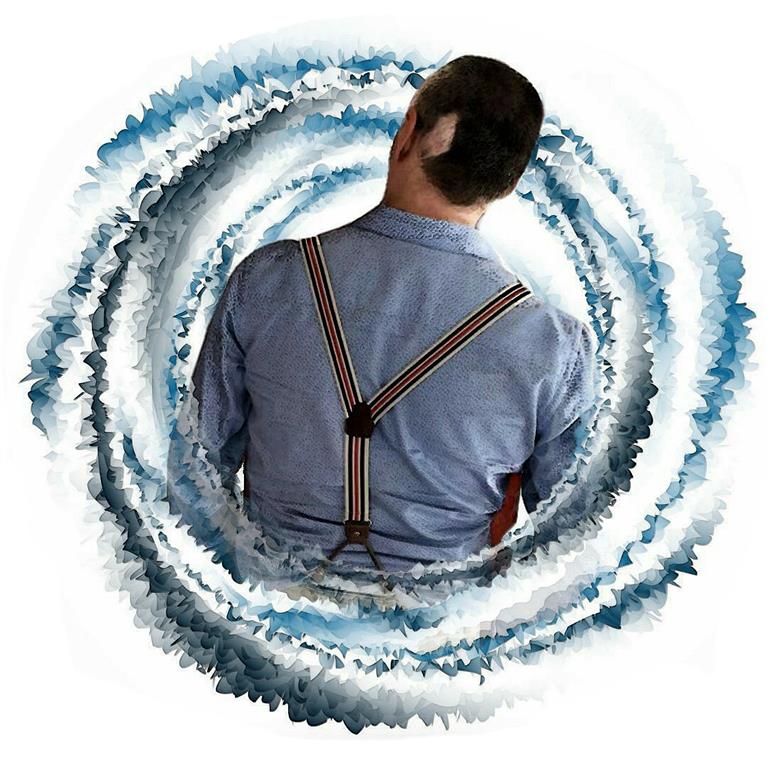Ordo Templi Orientis
background information
ONE MAN'S MEAT IS ANOTHER MAN'S POISON
An Interview with Peter-R. König
|
A.A.G.W.
Lothar von Kübelstrasse 1
D-76547 Sinzheim
Germany
"No, I shan't eat this Light"Q: Some biographical indications would undoubtedly help our readers to get a better purchase on your distinctly complex statements. So, if you can put it into words, please could you give us a bit of autobiography? A: I was born in Zurich in 1959, to an Austrian mother and a Swiss father. During World War 2 my mother was passed from family to family in Austria, as an illegitimate child whose father had fled the Nazis to the USA; he was last heard of in 1944 as an American combatant in the Allied Normandy landings, where he likely lost his life. Before the war, my mother's uncle had worked for a weapons inventor/manufacturer named Werndl. When the Third Reich absorbed Austria in 1938's Anschluss, Klausmann (as my great-uncle was called) became so incensed at the lack of protests in his hometown, that he joined the Communist party and became part of the anti-Nazi underground. He was caught and sent to Mauthausen concentration camp, where he was tortured by being crushed between wooden boards, in a vain attempt to make him betray his comrades' names. Despite his broken bones (including part of his spine, from what I remember) he stayed silent; then, still suffering from internal injuries, he was forced to labour at carrying stones. Because he had been employed by Werndl making rifles before the war, the Nazis moved him to a prison near Steyr, where he worked with other inmates in the jail's munitions workshop. Freed after the liberation he hobbled barefoot, still wearing his concentration camp uniform, all the way from Steyr to his home in Wels, where he died. And my mother? How, before all this happened, did she get to shake Hitler's hand? While Austria was being "brought back home to the Reich", early one morning in the spring of 1938, it seems the Fuhrer got lost somewhere between Wels and Steyr after his adjutant took a wrong turning. My mother, then aged seven, happened to be outside playing with some friends, when a car stopped in front of them and its occupants asked for directions. A man got out of the car and thanked the children with a handshake. My mother didn't recognise him, and only found out it was Hitler afterwards. After some time being passed around as an unwanted child because of her illegitimacy, she fetched up staying with the last surviving relative of the Brothers Grimm (of fairytale, dictionary and linguistic fame). According to my mother, Herr Grimm was a fairly typical Nazi, while his wife was a downtrodden, careworn woman. I got to know them both later on in the 1960s: Grimm a thin, unsympathetic type who still had a bullet in his body from an old Great War injury, which couldn't be surgically removed. This shrapnel tended to wander a bit, rather like Grimm's mind. When the Allies liberated the concentration camps in 1945, Grimm, like many other Germans, had been forced to help clean them up. He returned from Mauthausen traumatized, with hair that had turned snow-white. Frau Grimm had meanwhile become a fanatical Jehovah's Witness, who even managed to press one of their tracts into my hand from what proved to be her own death-bed. I found the booklet highly bizarre and unworldly, even world-alienating. Sometimes I've wondered if the Grimms weren't unconscious triggers for my occult researches later on: a mix of Nazi terror and Doomsday prophecy. Air raid alarms, near-miss explosions, hit by a stray bullet, air-raid shelters. Russian occupation. Harrowing memories best left unspoken. After the war, my maternal grandmother married the brother of her husband who'd died fighting the Nazis, while my mother emigrated to the UK to work as an au pair to a Jewish family in London. During the war she'd been fed the Nazi blood-libel propaganda that Jews were monsters who killed and ate babies; unable to believe this, she had resolved to convince herself otherwise. She then met my Swiss father, who had come to London from Paris, having worked as a stock exchange-crier (responsible for publicly announcing the buy and sell orders of traders). My father had lived a pretty wild life up until then. As a child, his parents had been compelled to send him off to work on a farm, because he'd proved so hard to keep in conventional schools. After the war, he got his first job on the Paris Bourse, where he soon become a public figure, appearing in the headlines after he and his then girlfriend had tried to auction her baby off to the highest bidder. He still had the newspaper-clipping, and showed it to me once: "Jeune Suisse veut vendre son bébé". He also had a special photo album in which he'd pasted photos of his many, many girlfriends. He was full of tall tales from this time, like how he'd got mixed up in smuggling contraband jewellery in and out of Prague by train, or about the house full of prostitutes where he used to live in Paris. But after he married my mother, his lifestyle calmed down — a lot. My main image of him now is of a glowing cigarette-end, as he sat in our dining-room in the dark, listening to one of his favourite swing-records playing. 
[Colored with AI] Apparently, it was intended that I should be born in Brazil, but for one reason or another my father's business plans fell through, so a native Swiss I became. In my early childhood, he spent several months at a military hospital in Davos to treat a lung injury he had sustained during target practice as a conscript. On Sundays, after brunch, my parents would sometimes dance to 'The Ray Conniff Singers' in the living room where two walls were adorned with an extensive collection of books. Among them, my mother held an appreciation for the literary works of Nelly Sachs, while my father preferred to immerse himself in popular science and factual books about the Second World War. This always caused a certain unrest in my mother. I inherited my deep-seated dislike of totalitarianism from my mother, and my critical tendencies from my father. 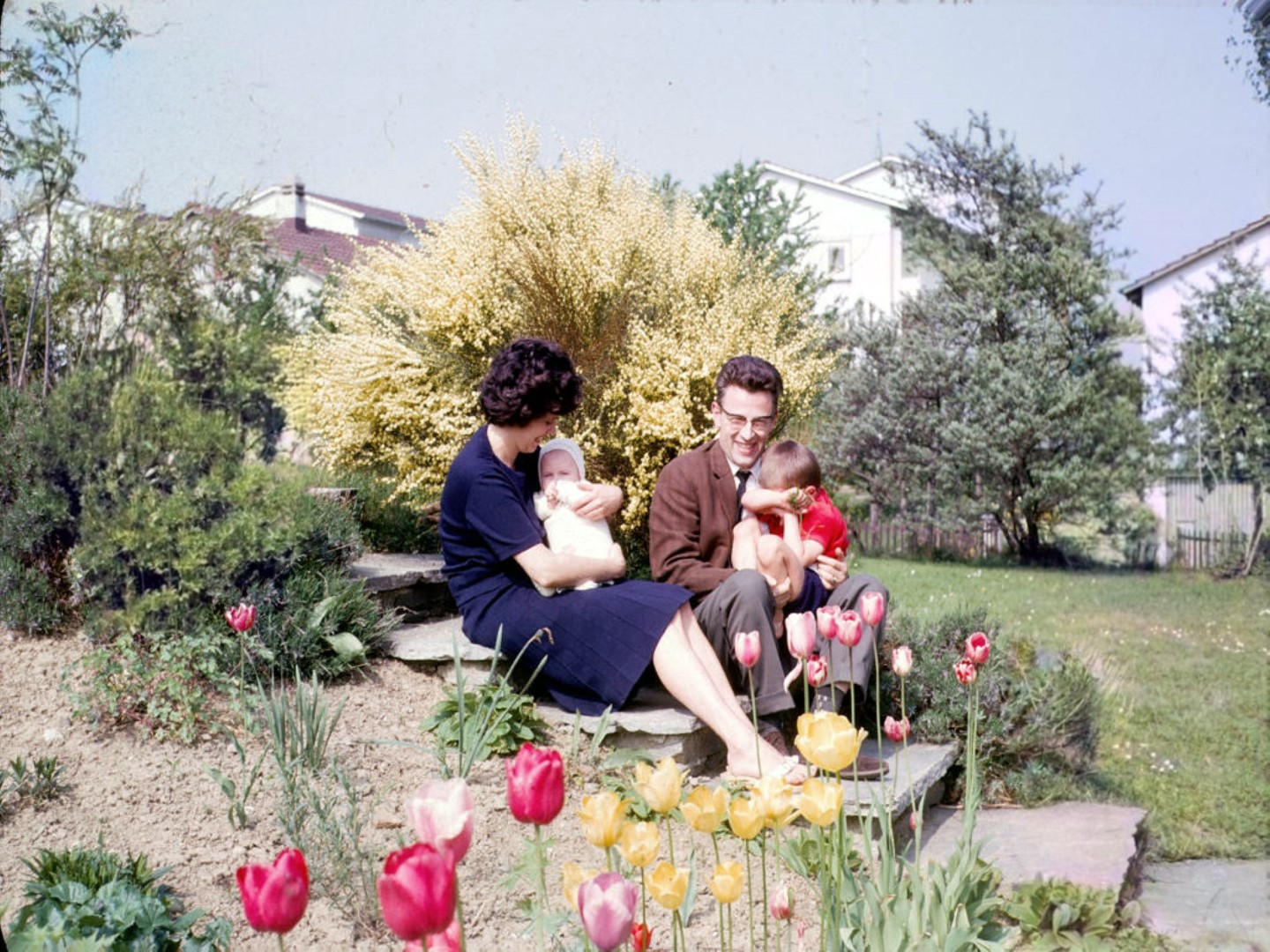
Easter 1963 with my younger brother When the university told me I couldn't possibly write a dissertation on 1920's popular music, because it didn't fit with my chosen subjects of ethnology and psychology — even though I'd passed their psychology exams without reading a book or going to a lecture — I moved to Berlin in 1981, and managed to sing on a record with some of the leading lights of the 'Neue Wilde' artists — 'Geile Tiere' (Lewd/Horny Animals). [The 'Neue Wilde' enjoyed high international esteem for a short time, but then quickly and thoroughly moved out of the focus of the art world.] Otherwise, I indulged in a few excesses. Oh yes, and since 1985 I've been putting together the bits of the puzzle that make the O.T.O. Phenomenon. Q: Nobody less than the reconstructor of the O.T.O. phenomenon seems to be hiding behind your books, interviews, articles, and lectures. You certainly seem to thrive on controversy. Kindly put yourself into a state of ecstasy before you answer that. A: That goes without saying. I'm a victim of two "petit-bourgeois" sins: gluttony and anger. Appeasement or political correctness leads to all sorts of regrettable and messy confusion, to the most stifling spiritual atmosphere, and the most pernicious influences. Vigorous polemics against such things throw your values and standpoint into sharp relief, and provide a healthy spiritual disinfectant. I focus on being objectively ironic about the FACTS (the functional electric flex is worth as much as the beautiful shiny toaster) and consequently, I tear the anal taboo into little brown pieces. 'Occulture' is swarming with a great mass of creatures who work anonymously and non-creatively. In general, I stigmatise failures of judgement and courage; I point out people's fear of new things, of words, of the risk of being laughed at — and especially the somnolence of fusty occult milieus, and their critics in intellectual circles. The most extraordinary of determination and skill will always be redundant if they are are wasted in producing specialised studies that follow a useless methodology. Nevertheless, it would be terribly easy to smuggle all sorts of stuff into such works. No new tradition called into question, but the idea to challenge 'a tradition'. Then anyone who isn't sufficiently well-read (who isn't fully informed) can take something commonplace as being revolutionary. Unhappily, the rule in 'Occulture' is to engage in a bourgeois revolt against traditional values, while at the same time wallowing in such values. Hence the contradictions between revolution, anarchy, and the domestic bedroom, over-familiarity with the élite, money, and politics. If Aleister Crowley was still alive, or had someone to manage his affairs better, he would have been turned into a philistine icon by now, just as Andy Warhol has become a parlour-decoration. The media have superseded one sort of reality. Everything seems to be a 'given', and is nothing more than what it isn't. And so the void beckons as the last resort, the last open space on the map of popular resorts. Pop culture (in which 'Occulture' has found a niche) reflects the conflicts and values of this culture. And so I wend my way between alarm and bemusement, and have to put up with the blatant lack of originality (in 'Occulture' as well), and overcome the high obstacles of absurdity and platitude, which inhabit the territory nowadays. Even in "Gnostika" [the magazin where this interview appeared in print] the patina that's lent to ideas by the passage of time gets praised more and more. This is the result of all those 'antiqued' products that come into the world pre-aged. 'Occulture' is a half-baked reflection of the sort of outlook which can't grasp creativity, unless it confines itself to monstrous platitudes which echo in a void of speculation and vagueness. Silly rumours and unspoken snobbery also serve to ornament the gossip and corruption of people who cloak themselves as arbiters of religious wisdom. Only after the longest hesitation have academics (with their absurd rules and insipid formulæ) taken an interest in 'Occulture'; while 'Occulture' itself is now bred "in vitro" as produce for the publisher's supermarket, or disembowelled asexually at so-called international congresses, where it's given a first-class burial; the cadaver shivers until people are sure that it'll dance again. So I hold a piece of raw, hard-won, truth in my mind, so that others may toy with it afterwards. For that I use the language that comes to me most naturally — a language that I've earned the right to use by making sure that I've been as accurate and honest as possible, drawing strength from my sense of humour, and then still be able to sing Friedrich Hollander's 1958 song 'Spötterdämmerung' about the clown: Und bringen nicht die grossen Sujets Spötterdammerung kommt auf leisen Sohlen Aus der Belämmerung ist kein Witz zu holen." ("Moths live in clichés And do not produce the greatest themes Mockery's twilight comes on tiptoe You can't get a joke out of lameness.") Q: Do you make use of post-modern rôle-play as well? A: The post-modern discloses the incipient resemblance between the personality and its rôles. These rôles are the multiplex or decentralised selves of the new landmarks in understanding. The connections between its fragments (or the fragmented perception) has a basis now as it did before, but it still doesn't bring any finally worthwhile truth with it. This leads one to the postulate of the instability of meanings, and their simulation as rôles. One of the favourite (oc)cultural rôle-plays is to make the world magical again by signs, icons, or archetypal symbols, and to question what they signify. For a long time we have been persuaded that the icon is the dress for the new spirituality, the magic wand which grants power to define things, which fills the wasteland with a new life. The formula goes like this: if the world conforms to a homogenous lifestyle, and icons (even religious ones) are responsible for illusion, then the opposite needs to happen; where everything is ambiguous and leaves you confused, why, Adidas and the OTO, family values and Aleister Crowley will give your icons weight and support! The icon serves as existence's cosmetic mask, so when belief disappears, style takes its place. Fashion is a fixed test of character, self-knowledge and taste. The right choice mirrors our innermost feelings about the world. And as long as I'm going to wear a pair of Jean-Paul Gaultier designer glasses, then I'm interested in that sort of rhetoric. It isn't about swapping one piece of reality's jigsaw-puzzle with another, but about how those pieces co-exist absolutely. Or how to survive as a free Thelemite — that is, one not bound to an O.T.O. The Æon of Horus and the Æon of Maat are already immanent "today". This means that it's worth leaving yourself open to creativity. On that account I make use of a pre-romantic concept, in which it wasn't a case of 'History/story' but alone 'Histories/stories' — + I put myself into a condition of non-linear 'trance', outside daily consciousness; it was like the artists in Gugging's 'House of Art' when I produced such pieces as 'The Ecstatic Creation of Culture', "The McDonaldisation of 'Occulture'", or this interview. I create particles of worlds by accident. Q: Now we come to the part where we talk about what you're known for. Why does the O.T.O. occupy such an important place in your research? What drew you to it? A: I sense that neither you nor I can give a clear answer to what you're getting at. Obviously, 'the' O.T.O. is the sort of place where typical small-scale dramas take place, the sort that stem from our simian ancestry. It's like a safari-park filled with a noisy but common life-form, free to roam where it will, but which can only define itself through a bunch of characteristic beliefs that spawns interminable new kinds of behaviour. In connection with Spermo-Gnosis these complexities appear in a strain with which I am only too well acquainted. Perhaps I have the desire, probably somehow in the sense of Freud, to reflect something of society, both for its amusement and for mine? And so I've portrayed the American O.T.O. (for instance) as a manipulationist compromise, a suitable victim to the demands of Western consumerism; this is a group which uses Mozart and Mahler as background music for its weekly initiation rituals. Apart from trying to put their complicated statements and ideas into some sort of order, I have no connection at all between the O.T.O. and my personal life. Because of that, I've also been able to keep myself sucessfully free of being corrupted, and offer myself as a sort of projection-screen to show the void I mentioned before. I have anticipate being on the receiving end of some pretty funny gifts in connection with my work on the O.T.O.: people (supposedly) taking me to court over my works ('Materialien zum OTO' and 'How to make your own McOTO'); someone or other forging my identity on the Internet; somebody once set up a fan-page on the Internet called 'The P.R. Koenig Phenomenon' [defunct now]; someone else sent pornography to my home address (and here I'd like to take the opportunity to thank that benefactor for their anonymity); and I wasn't frightened off by threats of murder either. Q: Have you got any any stories about your researches that come to mind, which would let us interpret one or any of your states of mind? A: February 1997 at Cefalù; an international Aleister Crowley Congress funded by the City of Palermo, with a list of participants selected by Massimo Introvigne. Despite complaints of the head of the American O.T.O. (the 'Caliph') who hadn't flown in — hence there weren't any occultists there to spoil the august experts' good image. Lots of 'dottori e professori' took part in the lectures, and obviously thought that they had a lot to say on the theme of Crowley. But they didn't; and in spite of the very Italianate way they did it, I still didn't understand what they were on about. Amazingly, lots of these people genuinely wanted to talk about Crowley as a poet. It was plain these Italians thought that Crowley had been a ladies' man, and as a result they completely ignored the fact of Crowley's partiality for having oral and anal intercourse with men. I decided to enrich my lecture — given in Italian — with a verbal cocktail of sperm and vaginal secretions (although Massimo Introvigne, who had invited me to the event's fringe, wanted me to refrain from doing this). Afterwards a heated debate broke out among the journalists who were attending. One leapt to his feet in a rage and moaned that Crowley was being scandalised here — to which Introvigne calmly responded that to speak on Crowley and omit Spermo-Gnosis was like talking about Rubens and not mentioning his paintings, or referring to Freud without sex. Even Roberto Negrini (head of the Italian OTOA) sprang up from the first row of the audience (the second row was filled with cravatted Italian adherents of H.J. Metzger's Swiss O.T.O.), and held forth with a long opposing monologue. Gradually I began to doze off, and stared absent-mindedly into space. Suddenly I was shocked back into reality by Introvigne (he was sitting next to me) — his head was turning to me; he said "Maybe Mr. Koenig wants to answer this." Startled, I stared at the audience, and decided not to answer in Italian: "Erm, well, I did not understand everything that Negrini said. Could you please translate it into English?" Which Introvigne then did as well. Despite that, and to my renewed surprise, I still didn't understand a thing. Baffled, I then got hold of the microphone and said: "Listen, you have to get behind things!" gazing to Negrini; then I went back through everything I'd said in the lecture, explaining once again the significance of sperm as the vessel of the Logos, and the misogyny that derives from that. I referred to the most secret O.T.O. document, Clement de Saint-Marcq's "'L'Eucharistie', and that in the consumption of sperm for becoming divine, no woman was consequently required. They all fell into a sober silence, apparently bewildered at such disrespect for Italianità. 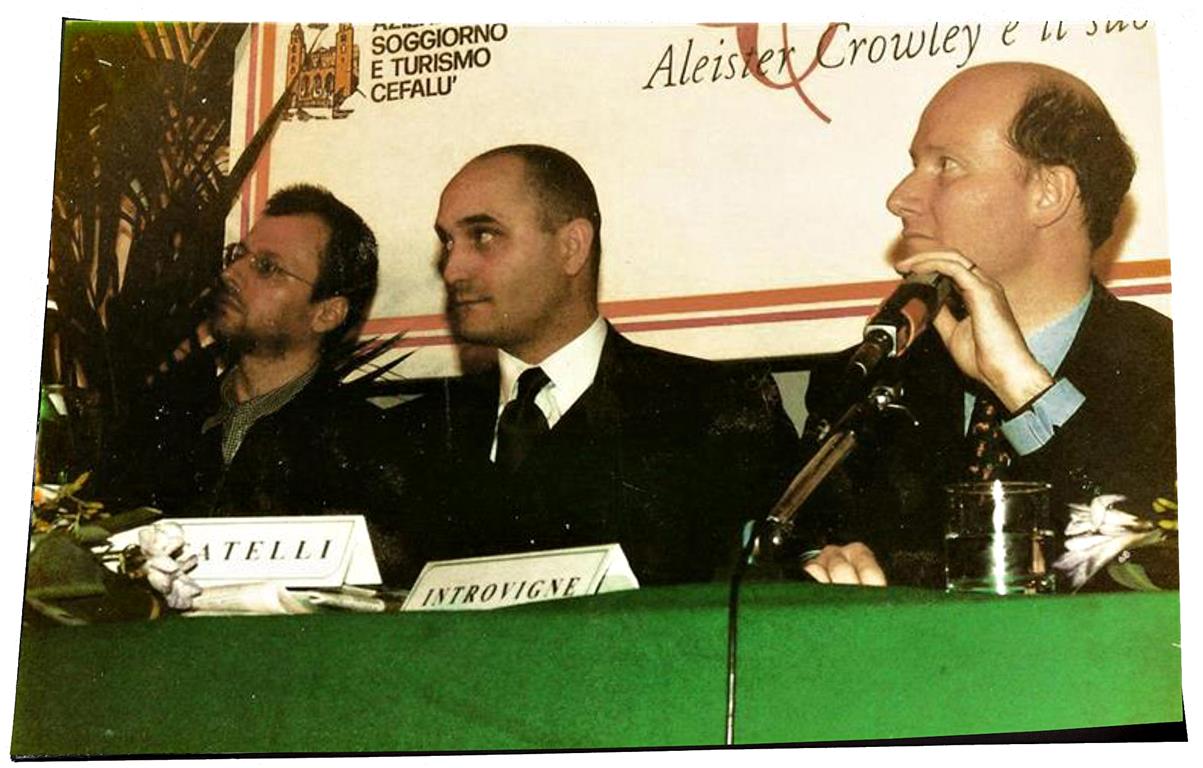
Peter-R. Koenig, PierLuigi Zoccatelli, Massimo Introvigne. The circus continued the next day. All the lecturers had received an invitation to go on a tour of the Palermo from the city's local authority representatives. I thought that would be better than seeing Crowley's crumbling Abbey of Thelema amidst horrible and rapid new developments of blocks of flats (which we saw the day before). We started from Cefalù at 6 that evening. The journey to Palermo took an hour, with us all crammed together into a tiny minivan. I discovered that every Italian owns "at least" one mobile phone, and there were often three people chattering away at the same time in the van regardless; sometimes they were phoning each other, but mostly not... We'd only just got to Palermo when Adele X, the town's rep., said that we'd have to do our admiring the city from inside the van. Thus we spent three hours trailing slowly through the darkness — of course, we couldn't see a thing. Then Adele wanted to show us round a famous church; needless to say it was shut, and so then we suddenly found ourselves in the local wax museum. There Adele got the vastly original idea that we should sample some sort of local delicacy, and she knew of a 'secret' address where we could get whatever it was, too. "E dopo bambini, andiamo a casa mia, to have some champagne!" Uh-oh, I thought — I'd detected a dangerous glint in Adele's eyes; she was about 60, but very plainly interested in the IX° OTO... So we wedged ourselves back into the minivan again, and were driven along some sort of waterfront, where Adele said she had some friends. And so she did; they were the 'aristocracy' of Palermo: ladies in sumptuous furs, dangling what looked like ten kilos of gold jewellery from each wrist, wearing very expensive shoes, and hairdos straight out of a John Waters film. We finally fetched up at a greasy fast-food stall in the middle of the night, which served oily hamburgers of unknown composition. Gordon Melton whispered to me "In America we call these slums." I whispered back "But here they call it Italy." You can imagine the scene: on one side the weird religion weirdos Negrini, Introvigne, Melton, Koenig, etc., and on the other these fur-coated ladies, chewing on their burgers and swigging Coca-Cola; one of them was soon smoking a cigar. Finally we were dragged up to Adele's de-luxe apartment, which looked like a mixture of Federico Fellini and Luchino Visconti. We sipped our champagne and dutifully paid our compliments: "Che bella casa, veramente bellissima!" Introvigne looked like a clown with his beret, telling weird and odd stories, while we stood there like a gaggle of exotic birds in a zoo. I muttered to Introvigne: "Hey, why don't we let Negrini do a Black Mass?" but after some hesitation, he declined, mentioning the chances of something like that resulting in a completely ruined reputation. Aha... After a few minutes, Adele said loudly: "Eee bambini, non sono invitati per dieci giorni, ma per dieci minuti soltanto!" And so we stood ready by the door again, each smoker had an ashtray pressed into their hands as a present to take home, and by about half-past three that morning we were back in Cefalù. Q: Oh dear... As we've been able to infer from 'Under Cover' (ARW), 'Aries', and certain facsimiles in some of your books, you have an immense number of esoteric and occult titles. Doesn't that contradict what Ellic Howe told you — "Never trust an occultist"? A: No. Proper ethnological work requires / demands involvement with the specific person / topic. That's another reason for me giving this interview. In order to pursue detailed (ethnological) field-studies, I became a member in a number of rival O.T.O. groups; this was so that in time I could (a) find out how easy it was to join them, (b) see what techniques each group used, (c) obtain internal material, (d) collect information about the members, and (e) publish "all" this information. Perhaps you'd understand it better if I compared it to being a researcher with a primitive jungle tribe? I made it clear right from the start that I would treat "all" O.T.O. groups critically, and that I never had "any" intention of dealing with occultism "per se". My contacts with 'Occulture', just like the accumulation of the titles, offices and dignities you mentioned, were made with the "sole object" of gathering information and then publishing it. Q: Were you trying to sketch out a kind of philosophy of marginalisation with your field-research? A: Your question answers itself. One of 'my' themes seems to be marginalisation and alienation within society. There are various sorts of alien discourse: pop-cultural, scientific, and what can only be called paranoid / pseudo-religious / esoteric. All three impinge on, surround, and infect each other. It results in a hidden legitimation; whenever someone distances themself from any alien discourse they've adopted — displacement (pop), pedantry (occultism), or rigidity (science) — they believe that they can convert the 'substance': "the discourse of the Self is thus real." Aren't occultists' alien(ated) fantasies really the same as those of 'abductees', the exponents of Free Jazz or hip-hop, or SF fans? Also in occultism one finds a current of coded marginalisation stories, about repression and submerged races (as in Nema's revelations and Lovecraft's pulp fiction). The interest in iconography, presences, penetration, and the spread of the Alien figure (e.g. Aiwaz, Abra-Melin's demons, Lam, etc.) leads to the reality of Aleister Crowley's Thelema. Depending on the area of interest, the Alien can be anything today; a virus, a particular body, something to be resisted, an identification, a criticism, or yet another kind of religion. Yet the coding may turn out to be so variable, that the explanation of motives gathers itself increasingly into the figure of the Alien, whatever the history of ideas was concerned with at the start: the relationship between the self and others, ageing and self-regard: a madness of ideas that can upset all complex relationships, such as body and pain, majorities and minorities, racism and sexism, etc. When and why did the Aliens become admirable friends or angels from 'out there'? Of course it was when we found the right distractions — drugs, Yoga, soap-opera — and were able to turn ourselves into a plant, a waterfall, or Lucifer for the first time. So how long has it been since Aiwaz and incarnations of Lam have been grateful for finding asylum in Germany? Q: As you have often stressed, you are pretty much able to retreat behind your works; I mean that your personality is almost hidden by your books. Is this why — with your last couple of books — you've only acted as editor, because although you're out there in the field, you had to make good by writing a couple of updates? A: "I am a very diverse person," as a postmodern Sphinx, Therese Giehse said. Your readers will find the answer in issue one of "Gnostika" for October 1996. After my most recent book, and two more articles for "Gnostika", I hope to finally retire from this field in 1999. But I remember complaining to Oscar Schlag ten years ago that it wouldn't be too soon if I never heard of the O.T.O. phenomenon again; he grinned, and said: "Whom the serpent once has bitten..." Q: Could you recommend some reading to our readers, so they can understand your attitude to 'Occulture' better? A: Hmmm:
And of course the complete works of David Bowie, the richest Threepenny-Gnostic of the New Age, who created the masterly line: "For you're dancing where the dogs decay, defecating ecstasy". |


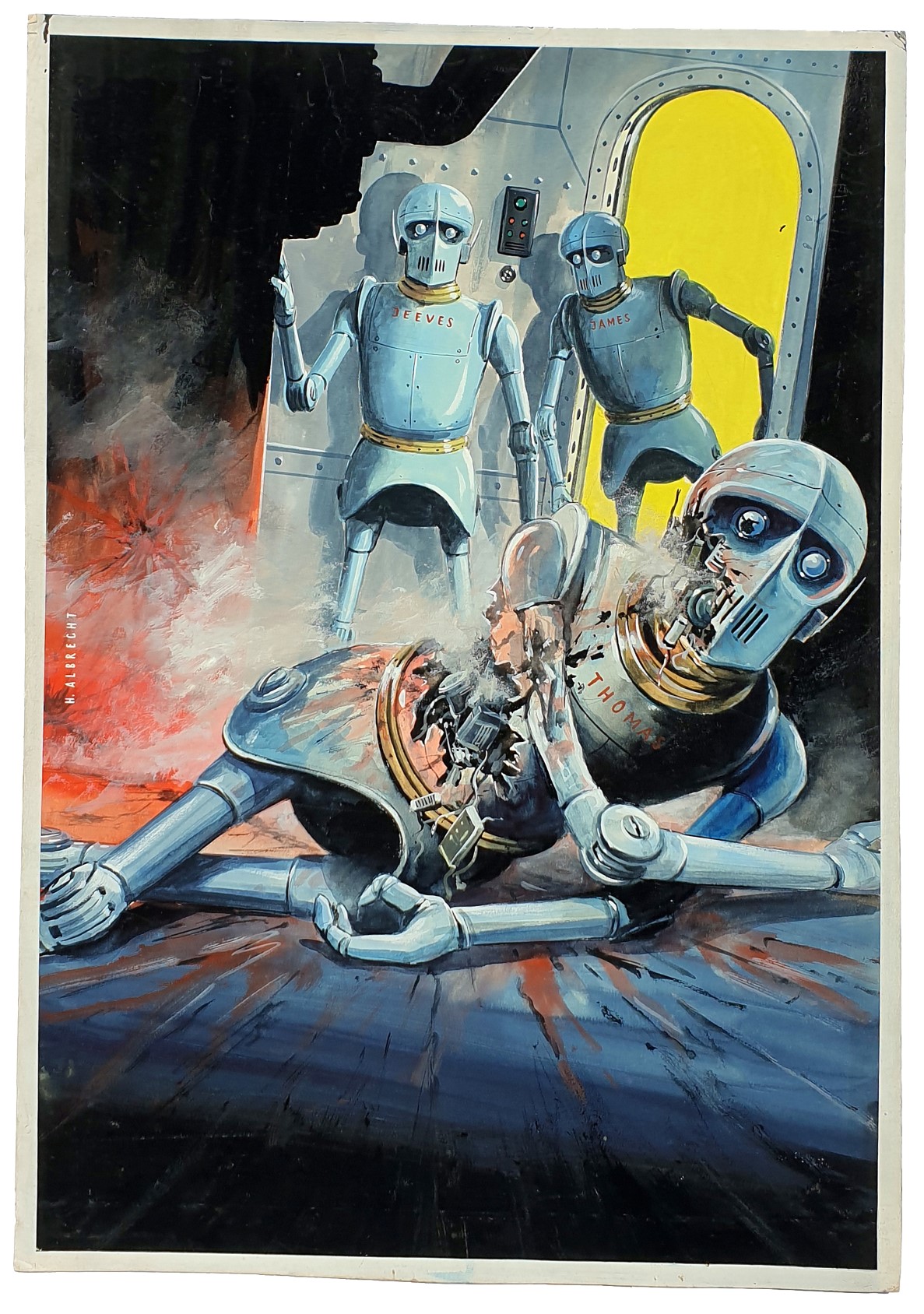
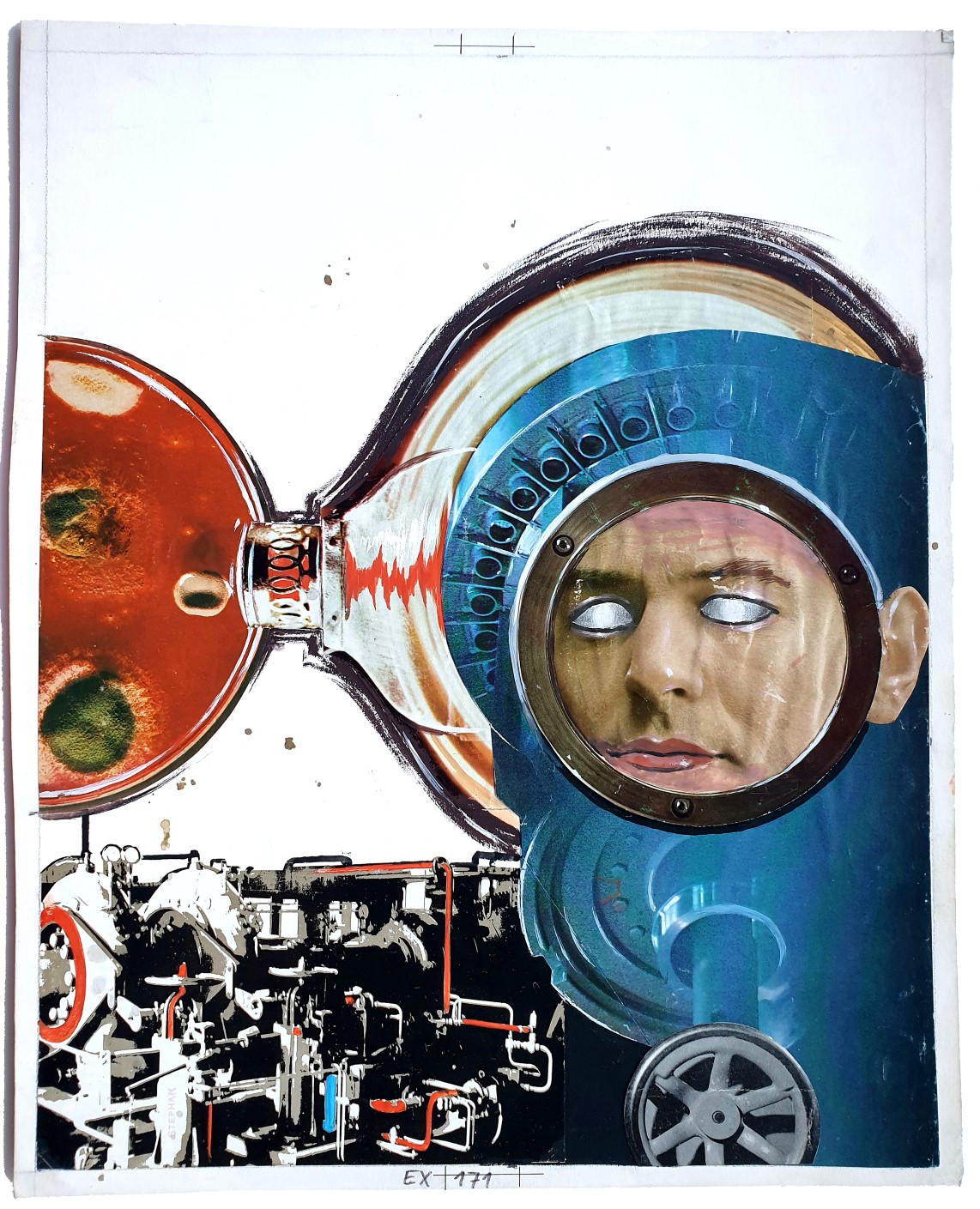
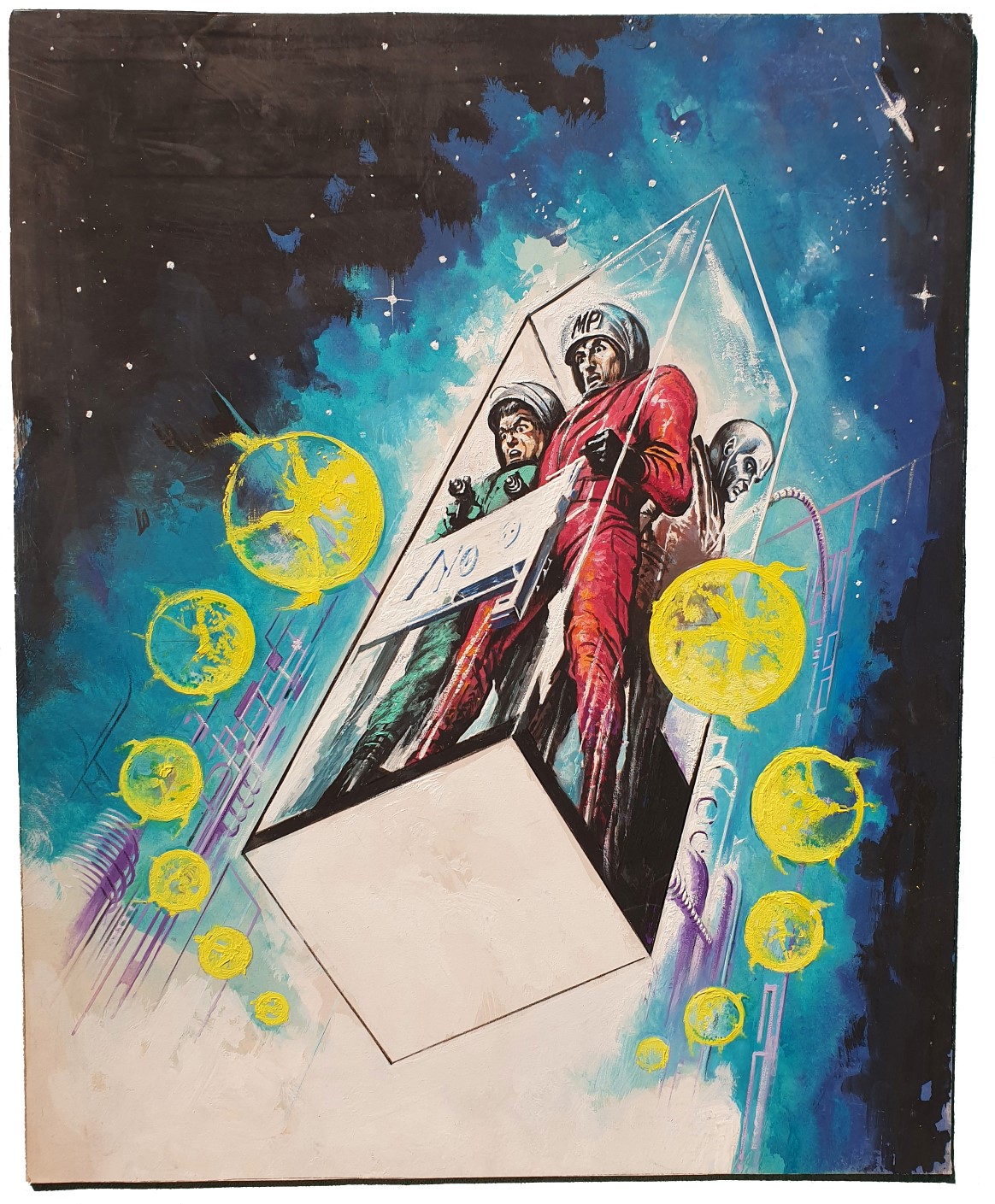
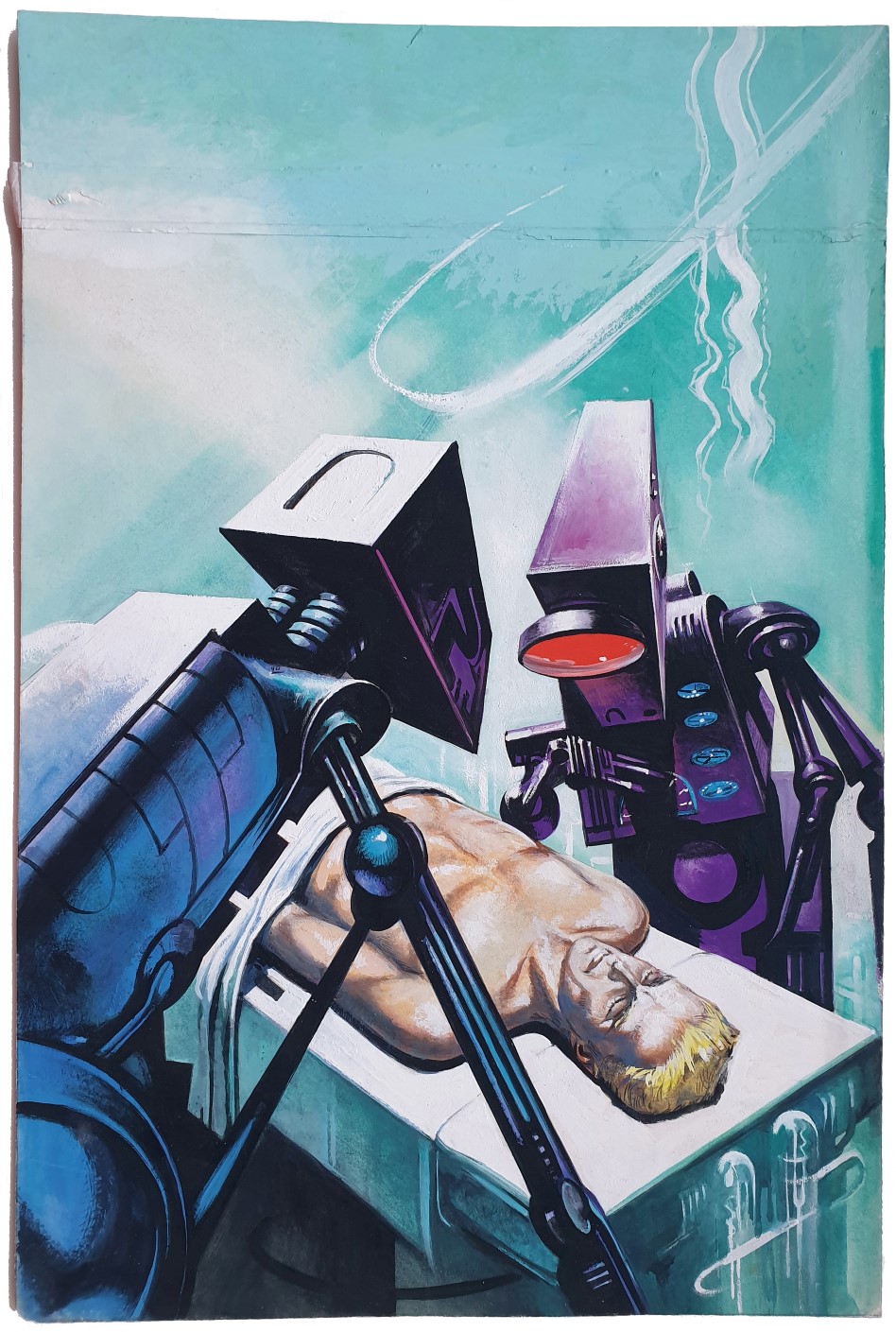
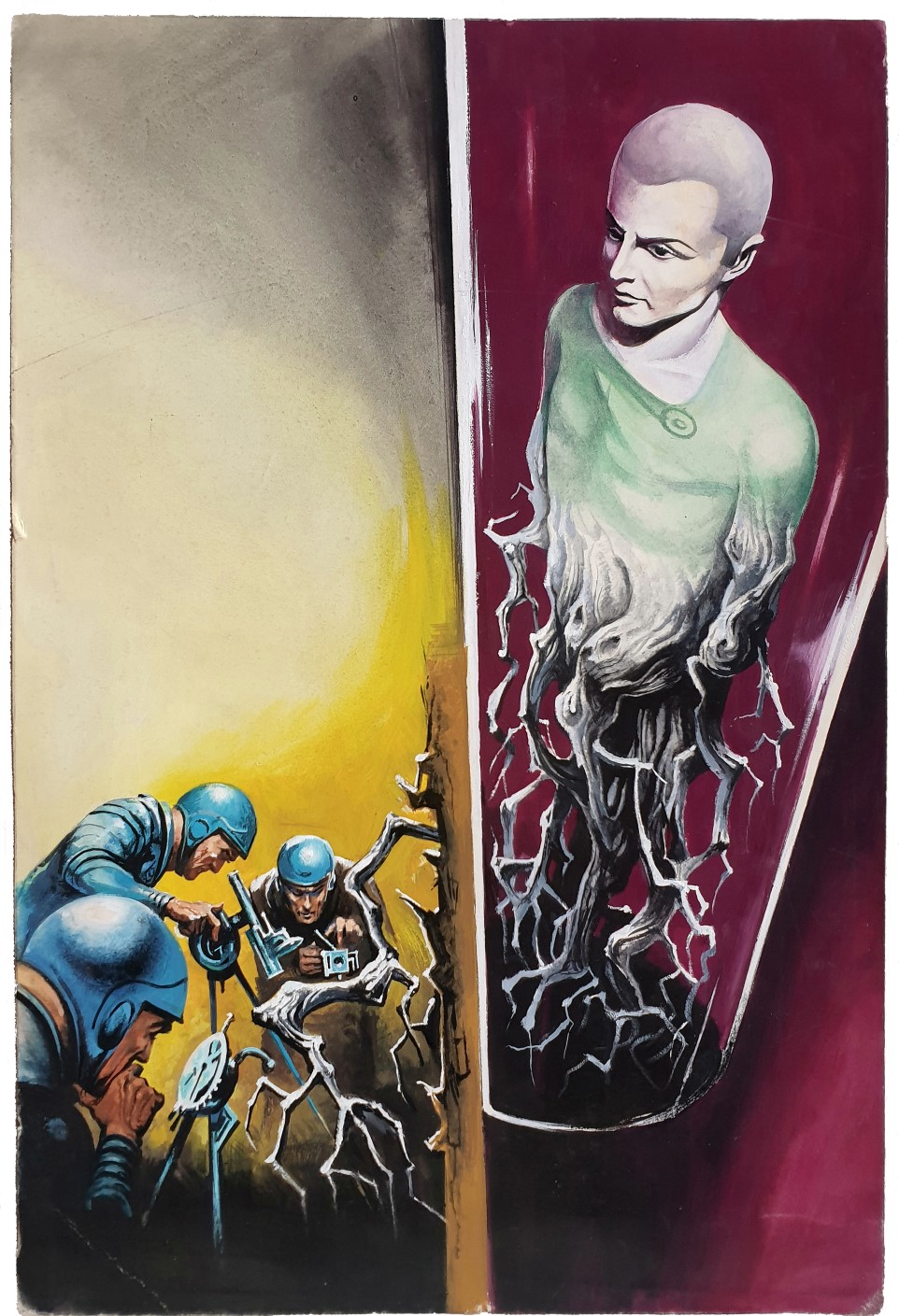
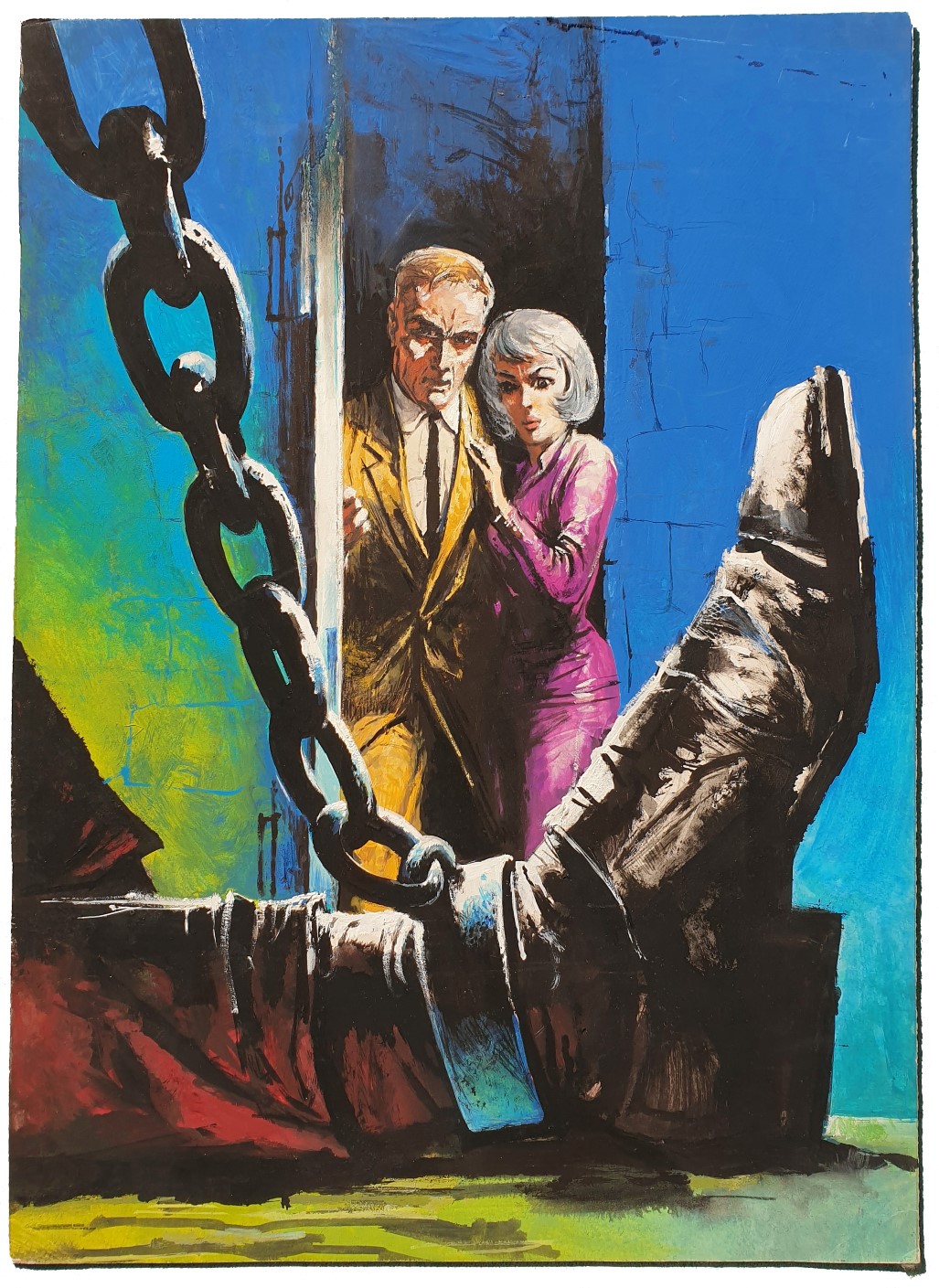
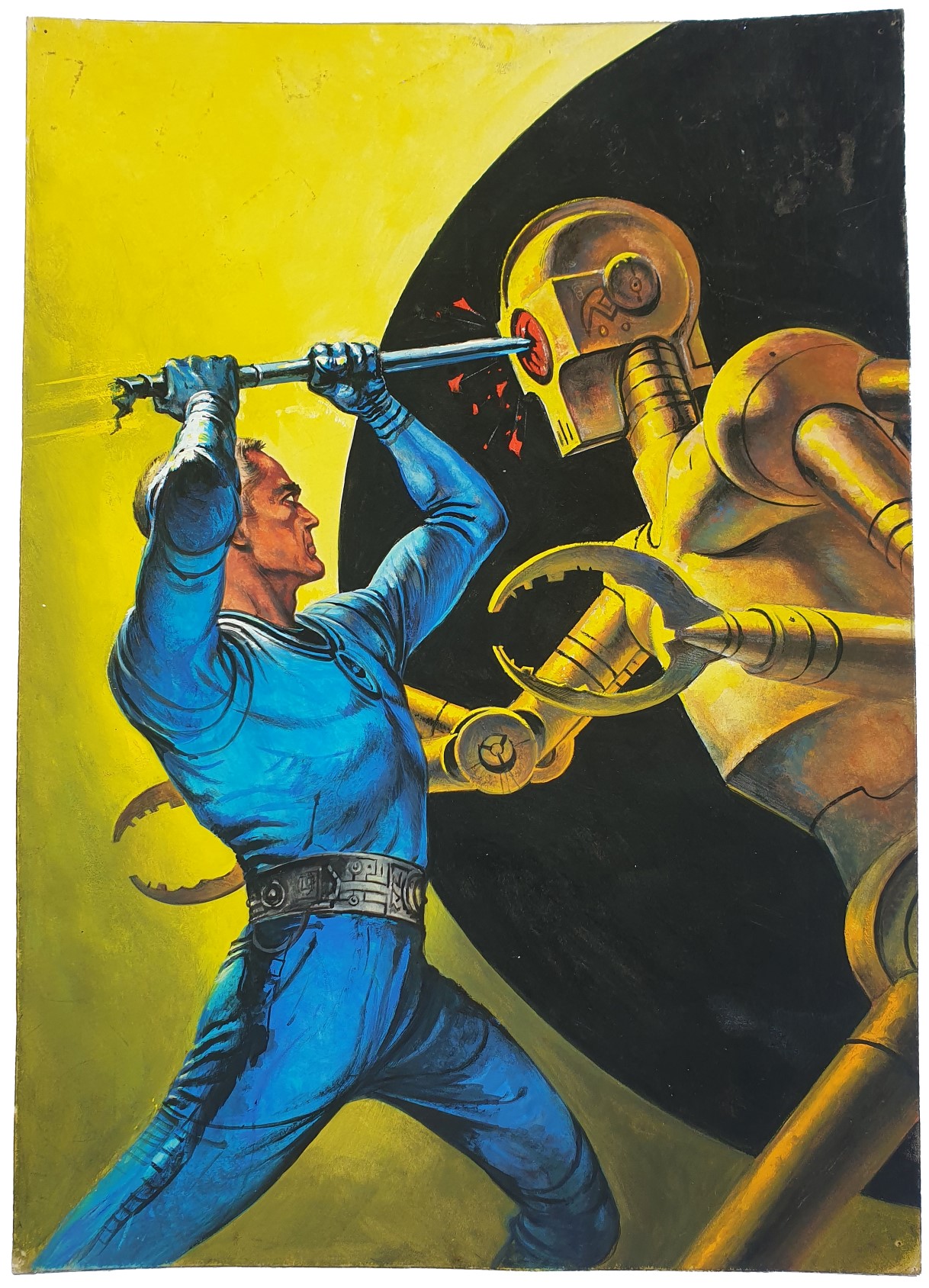
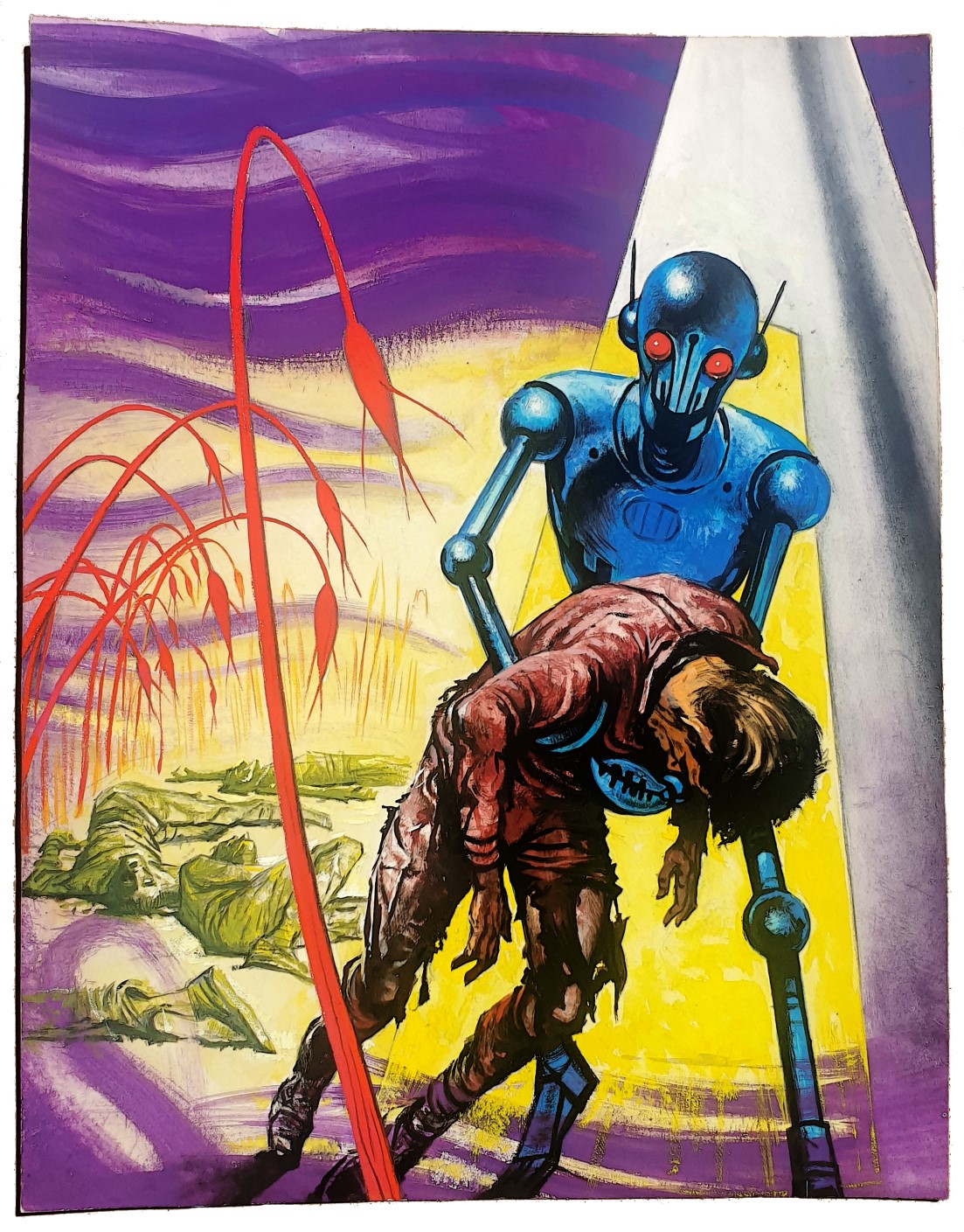
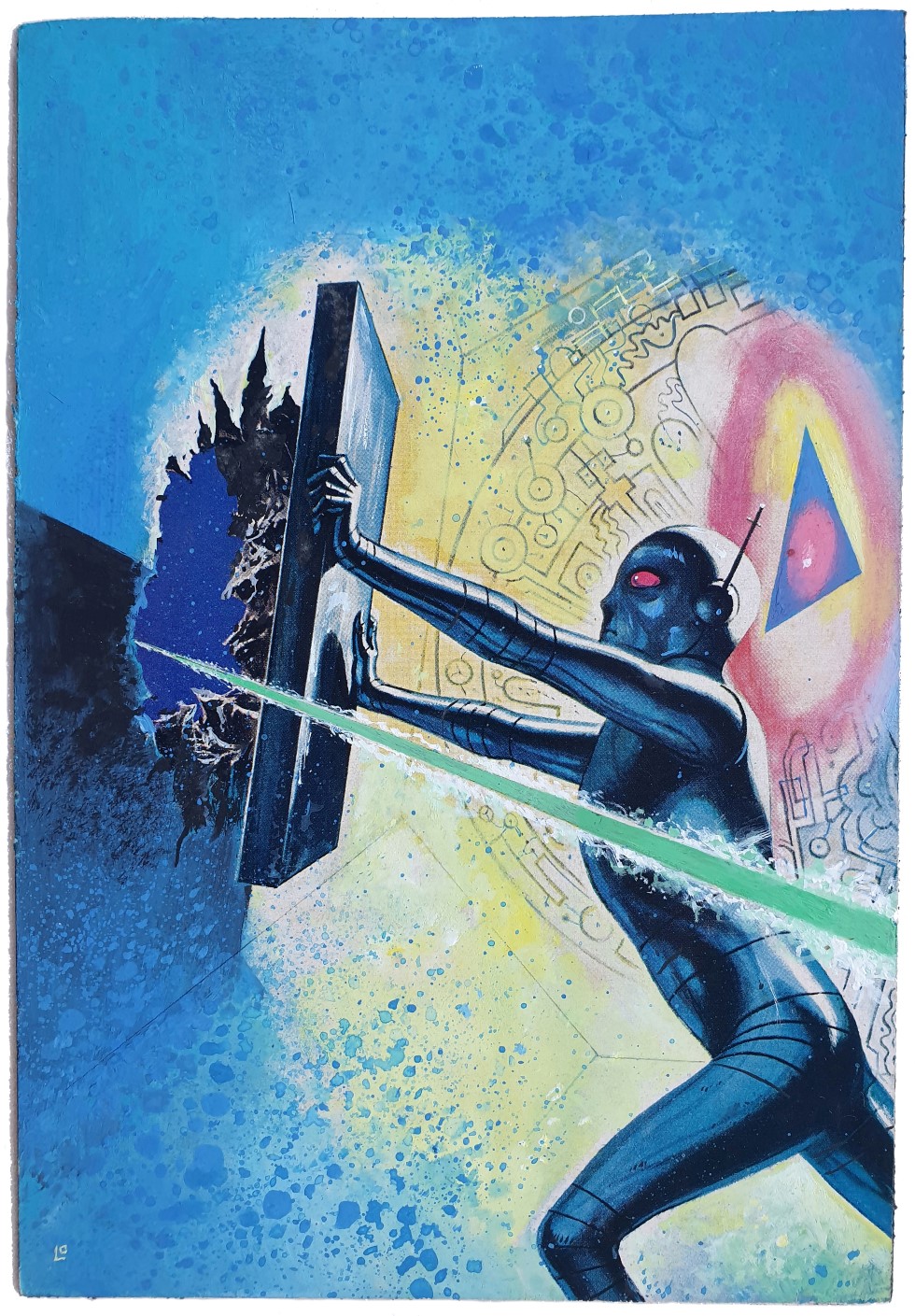
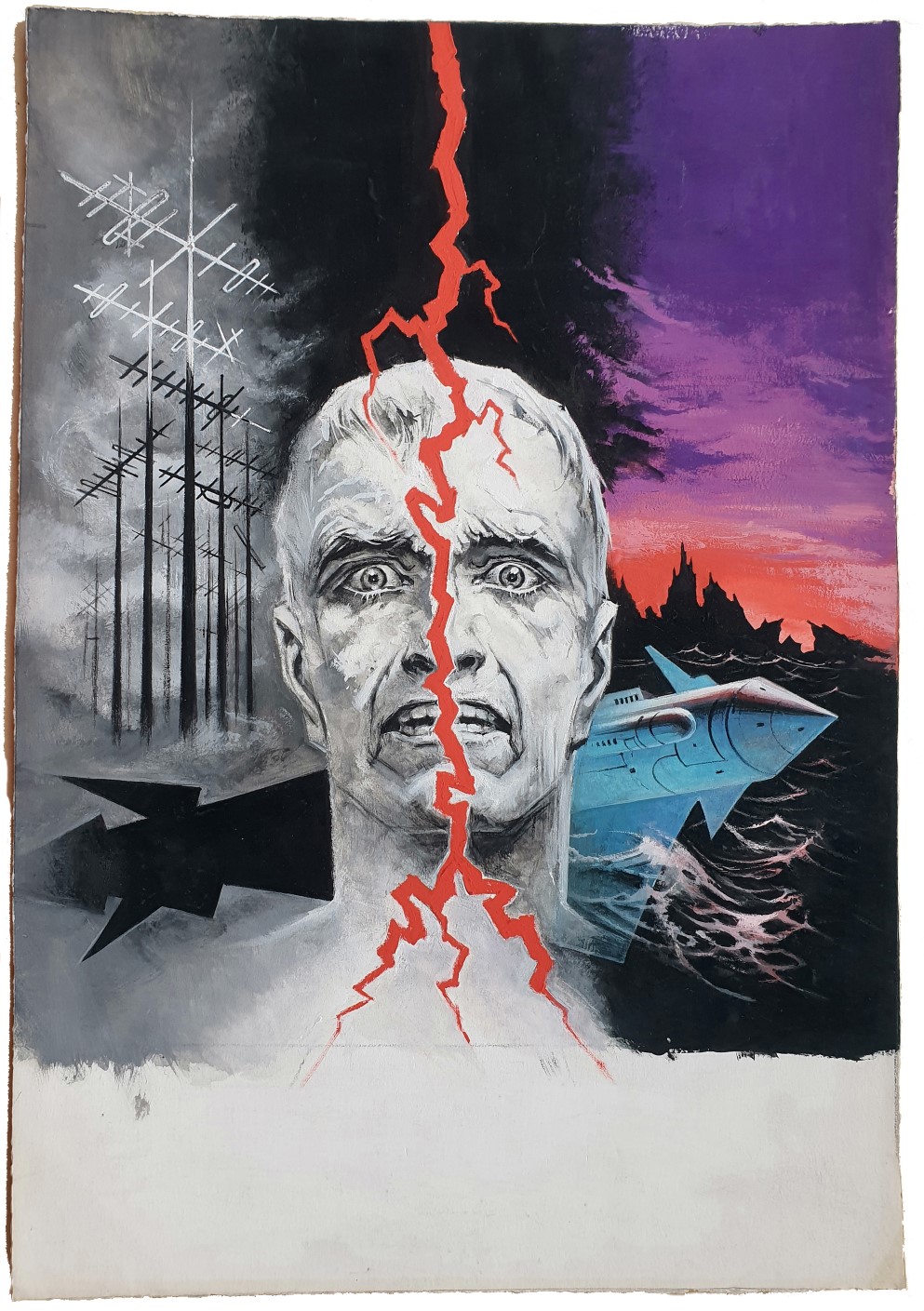
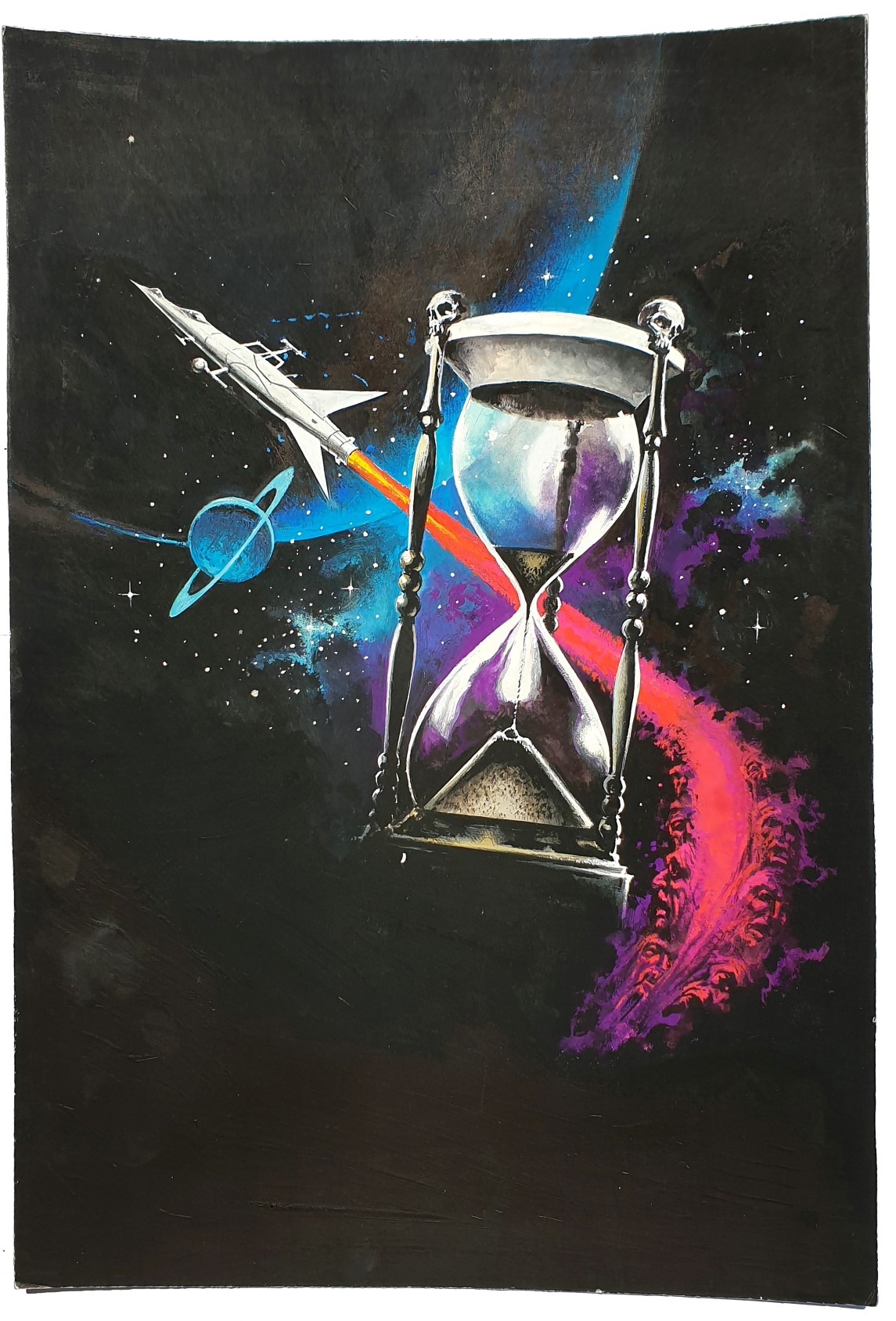
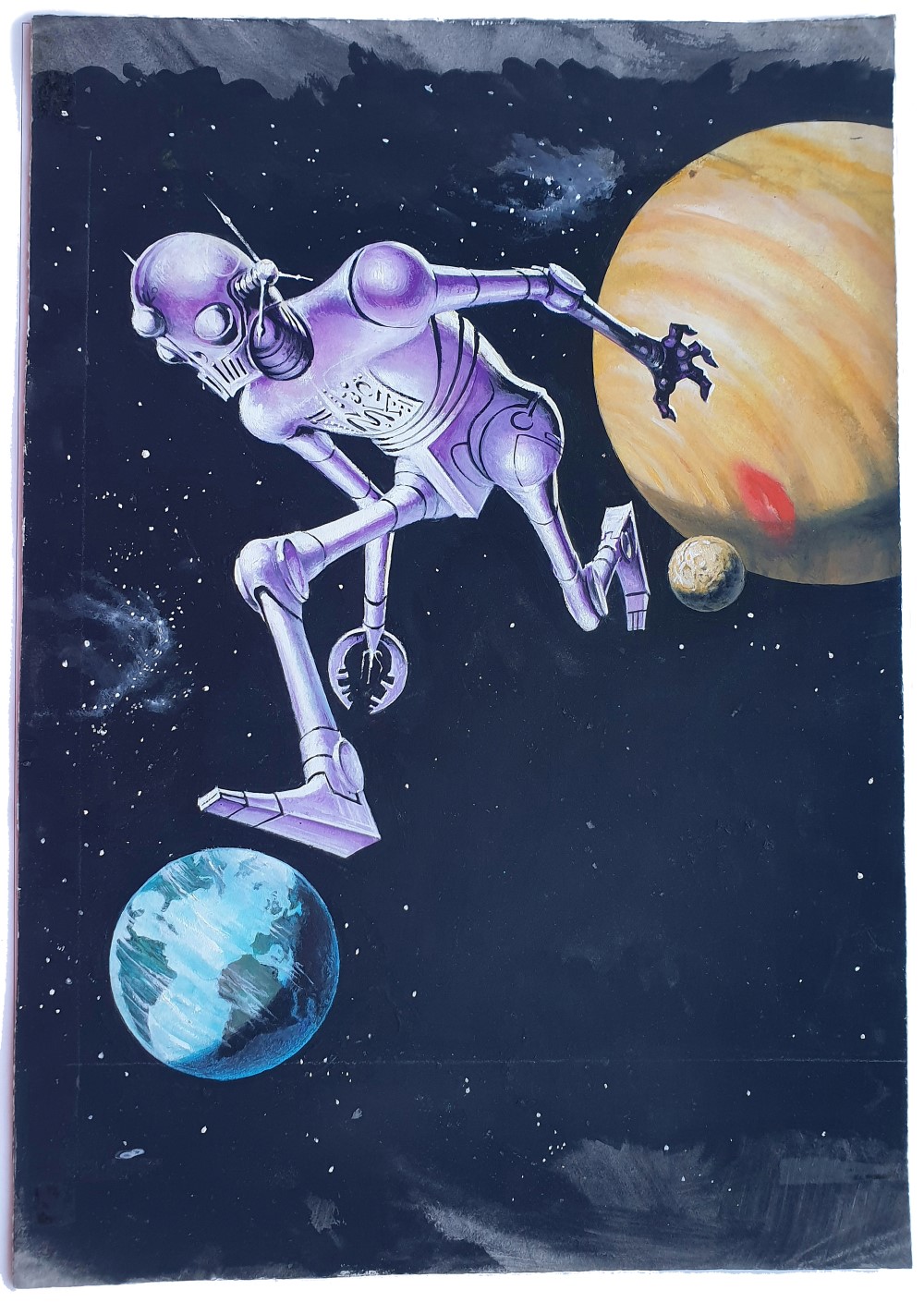
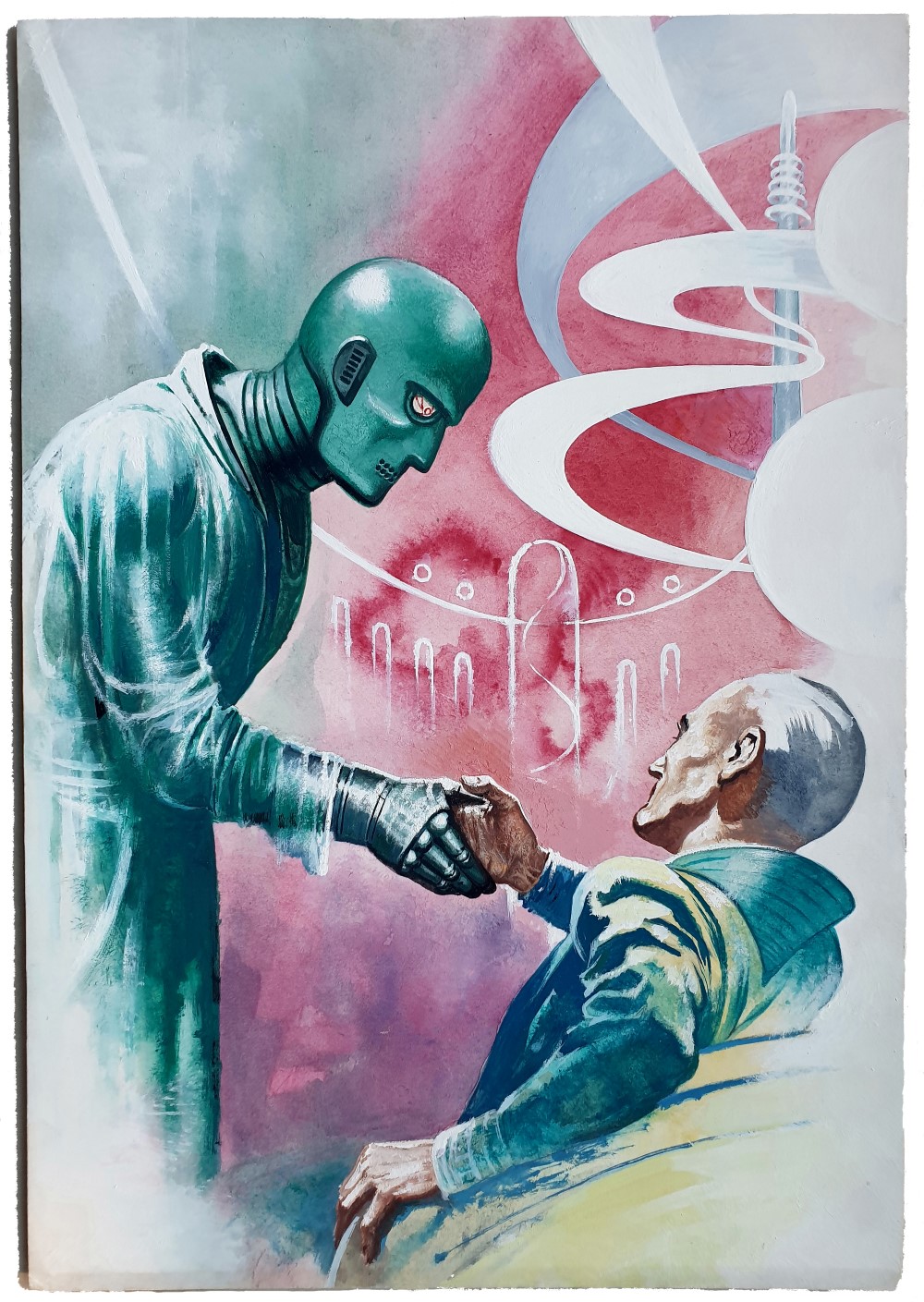
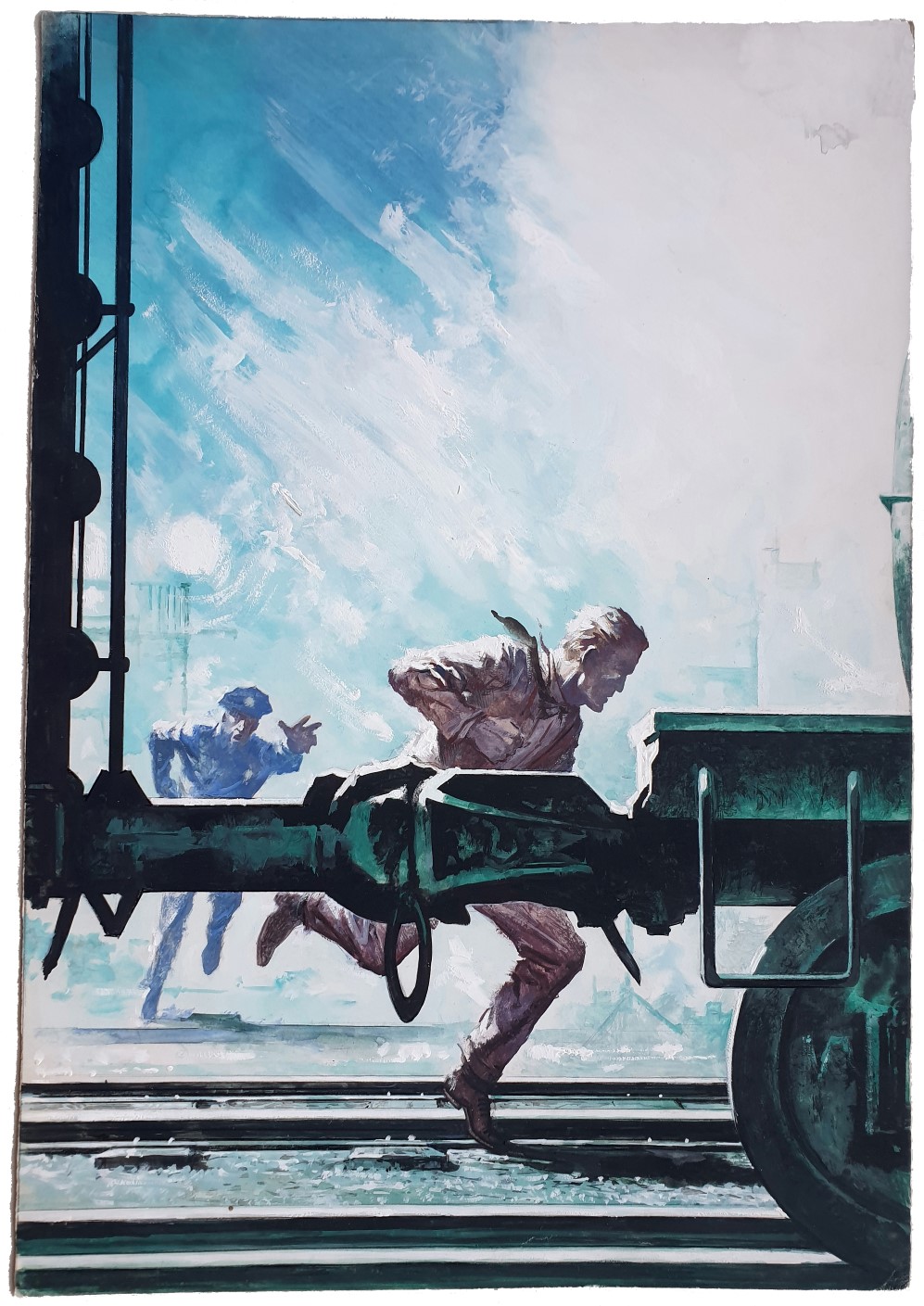
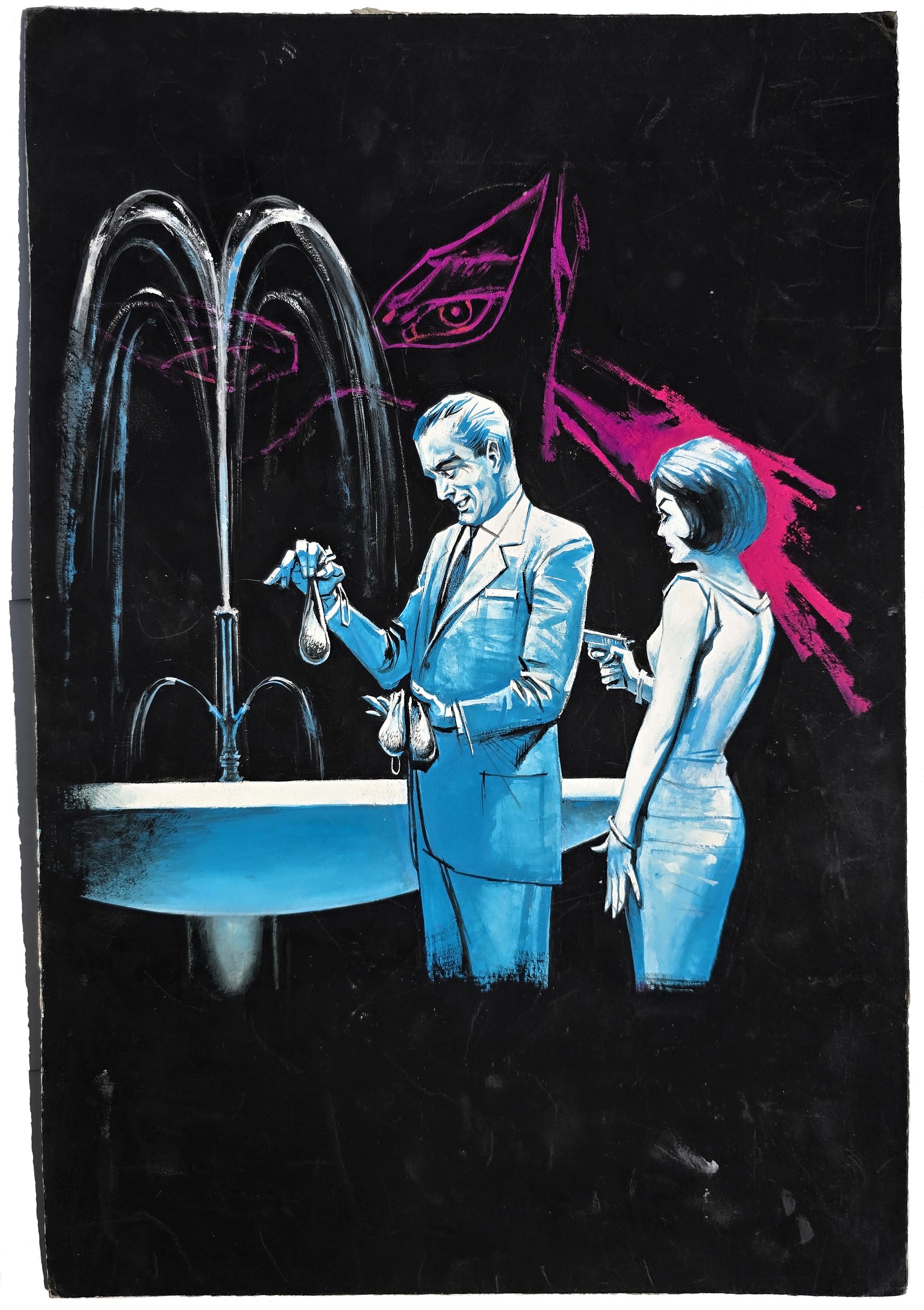
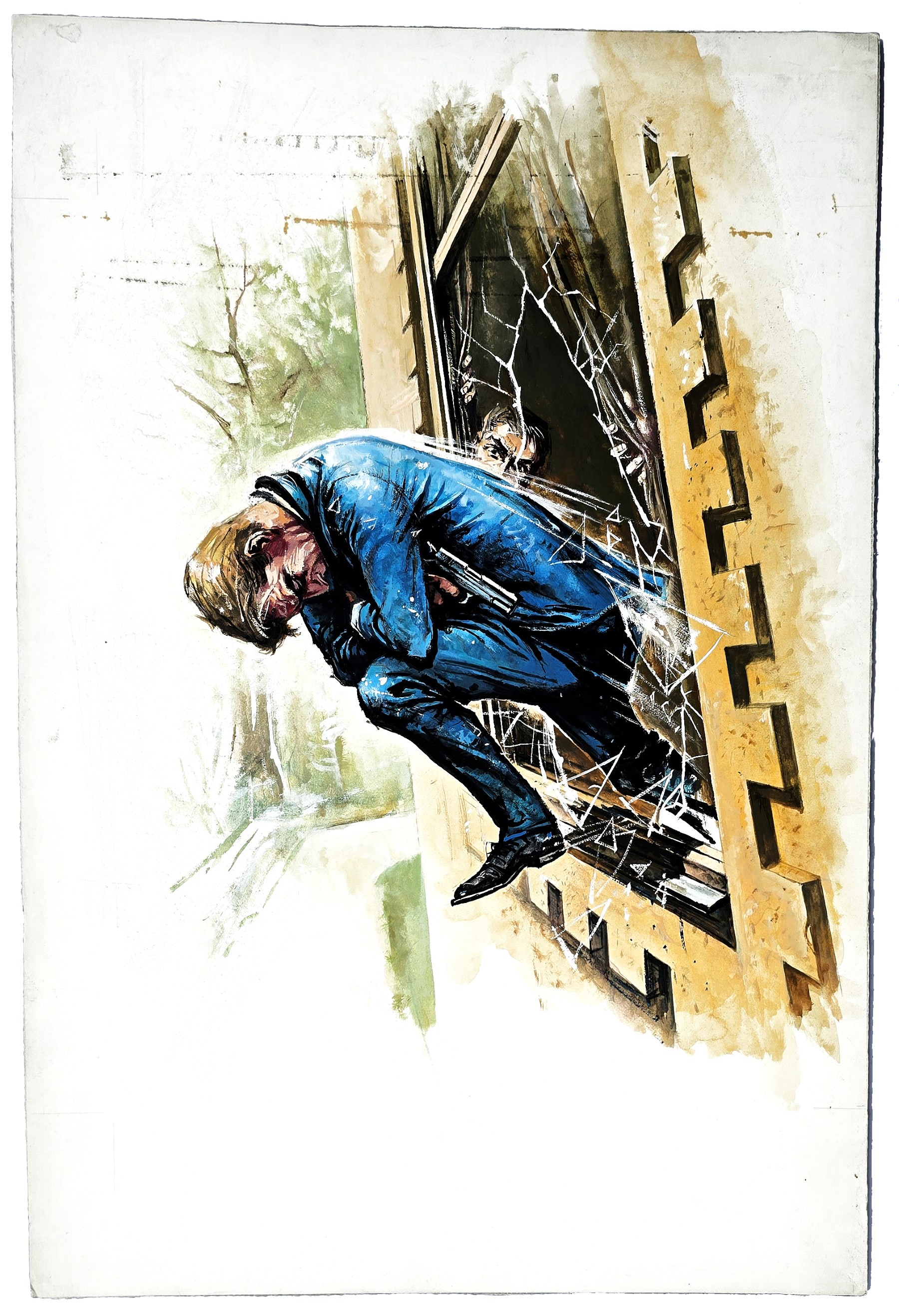
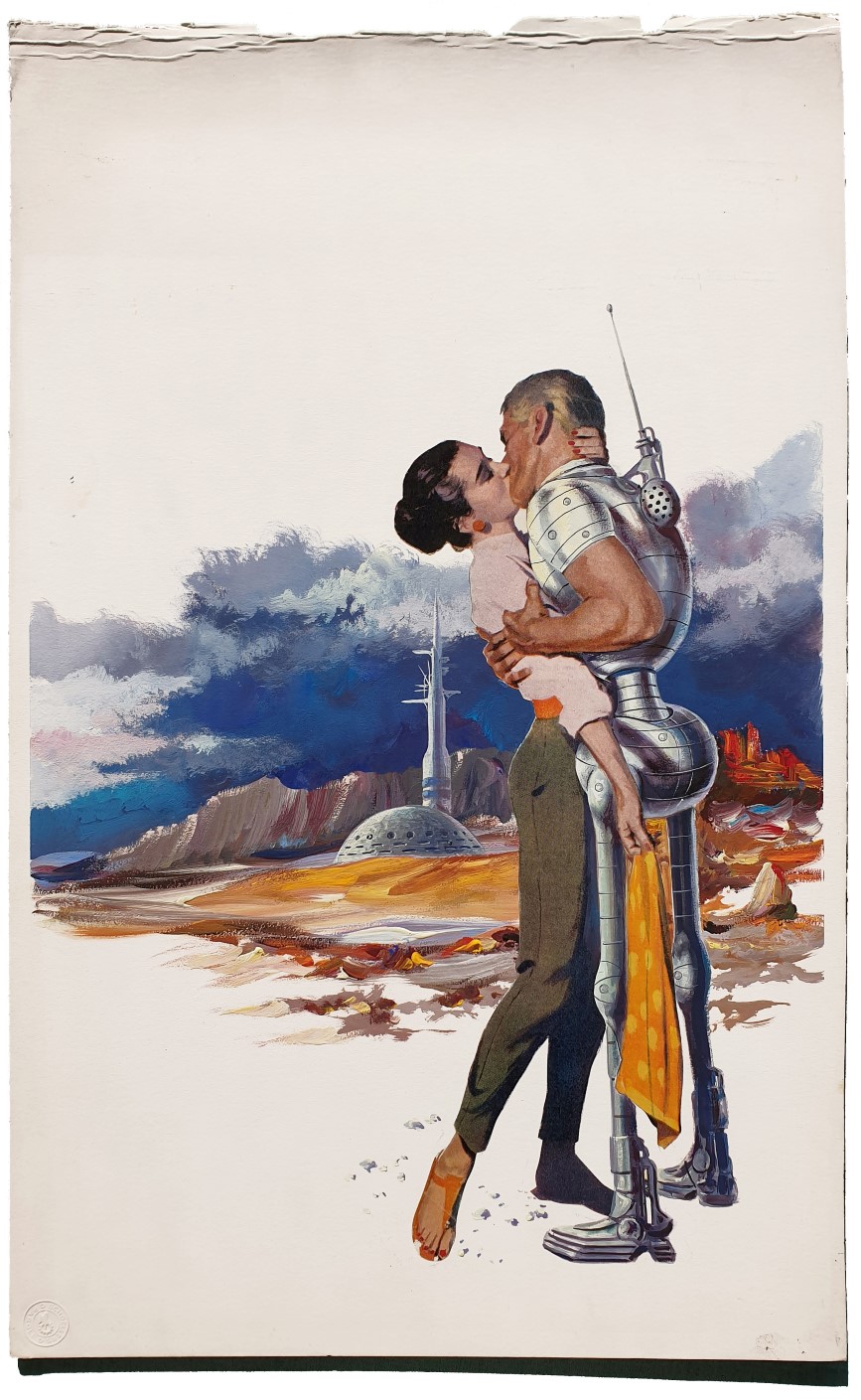
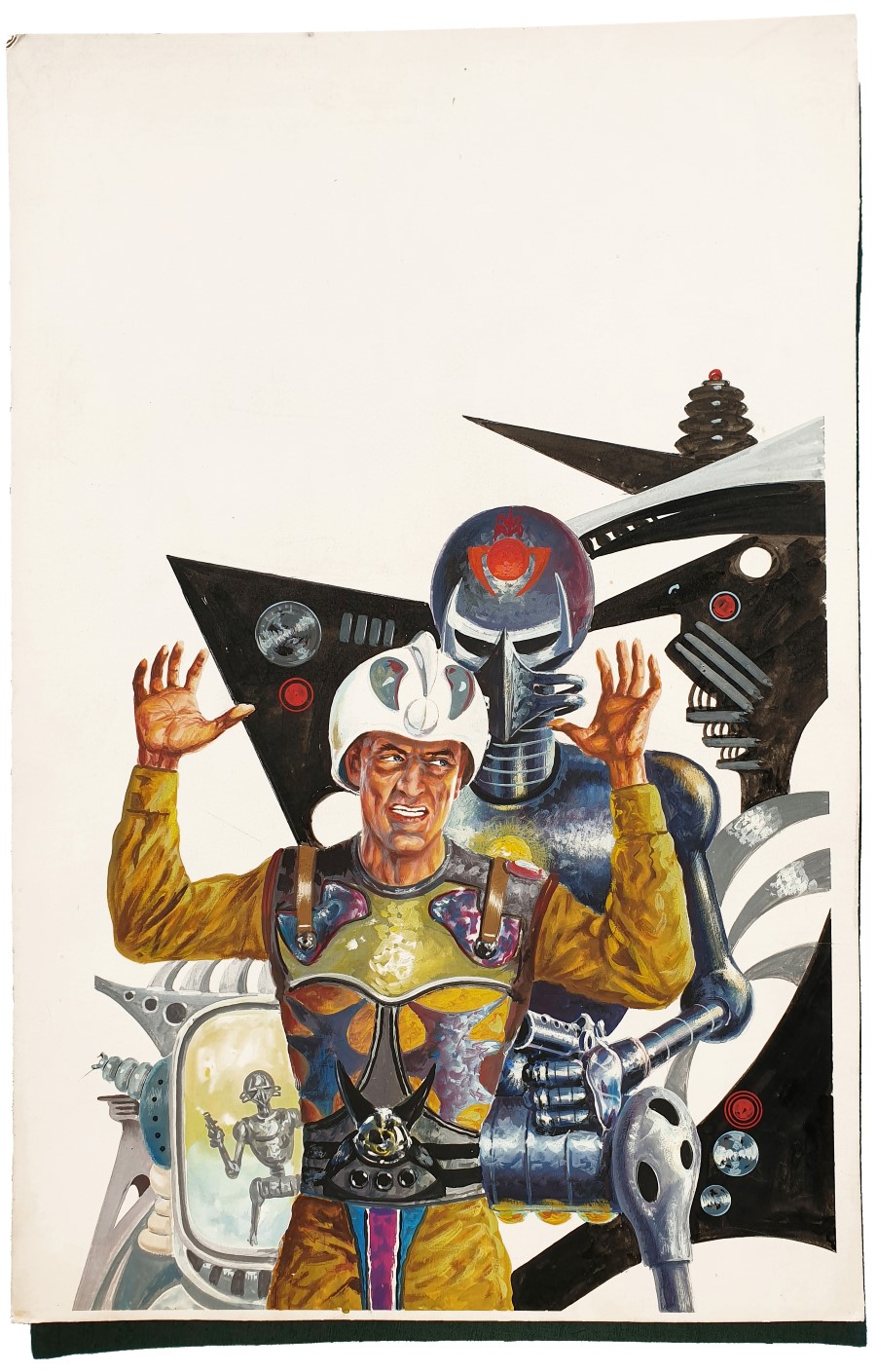
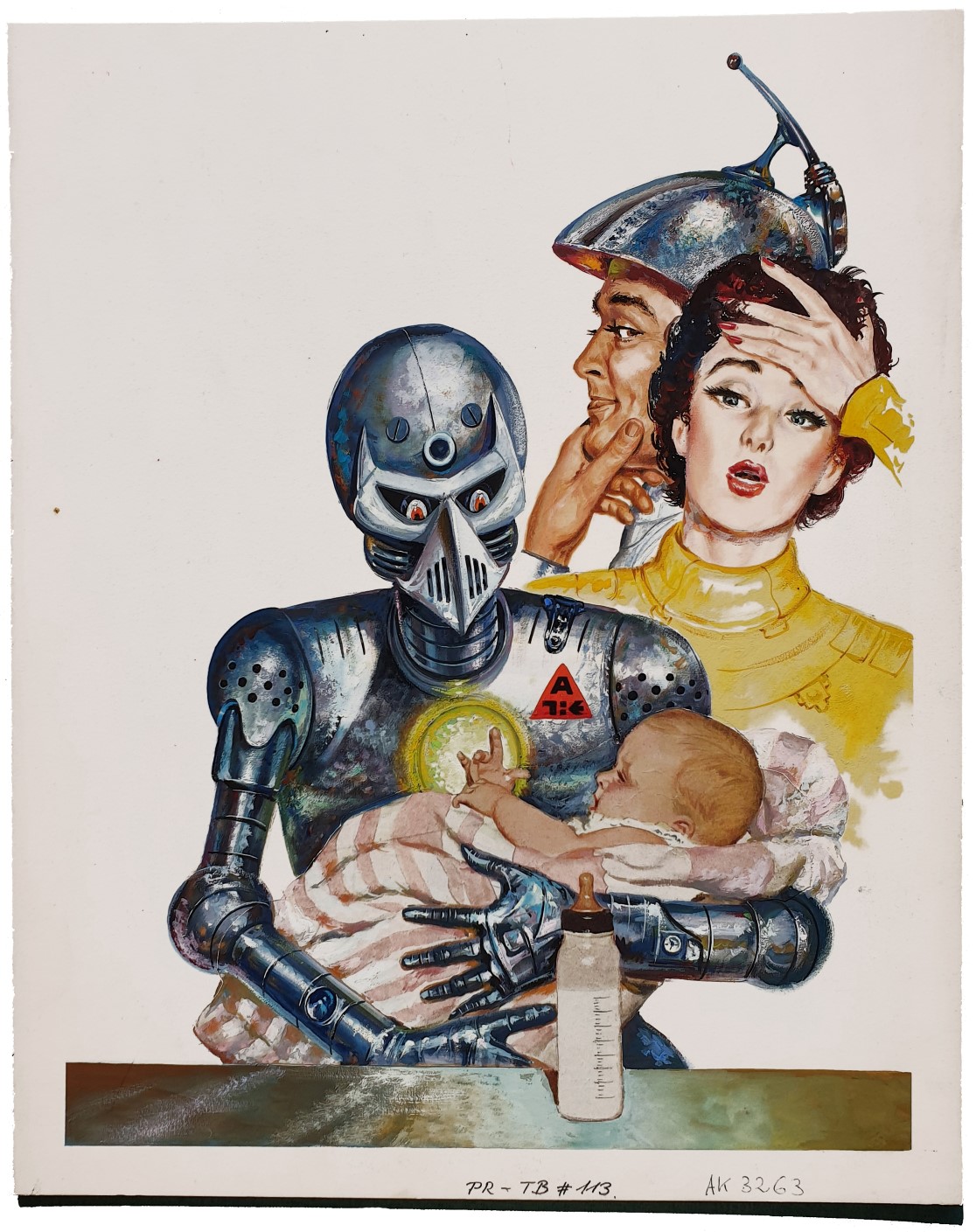
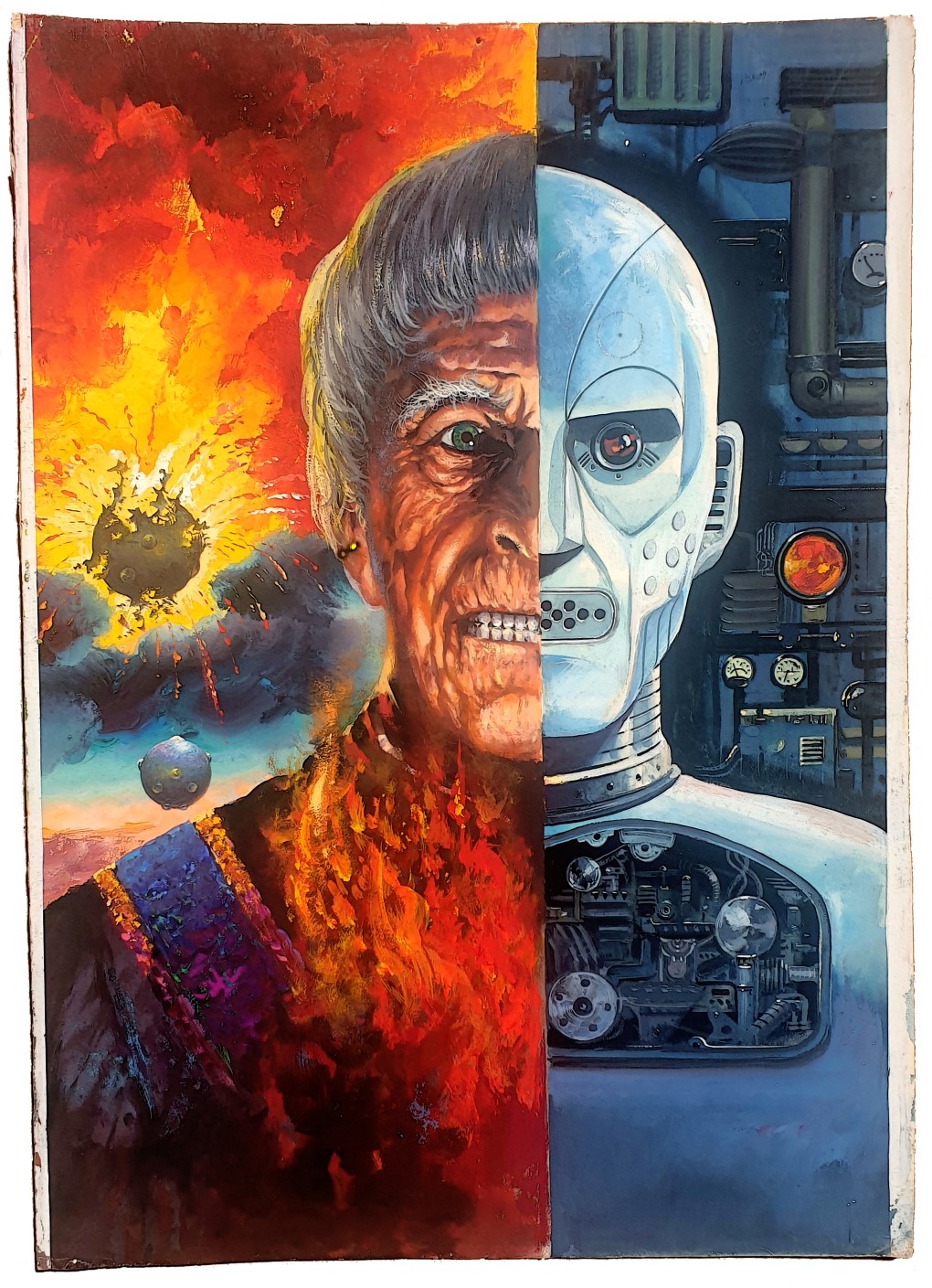
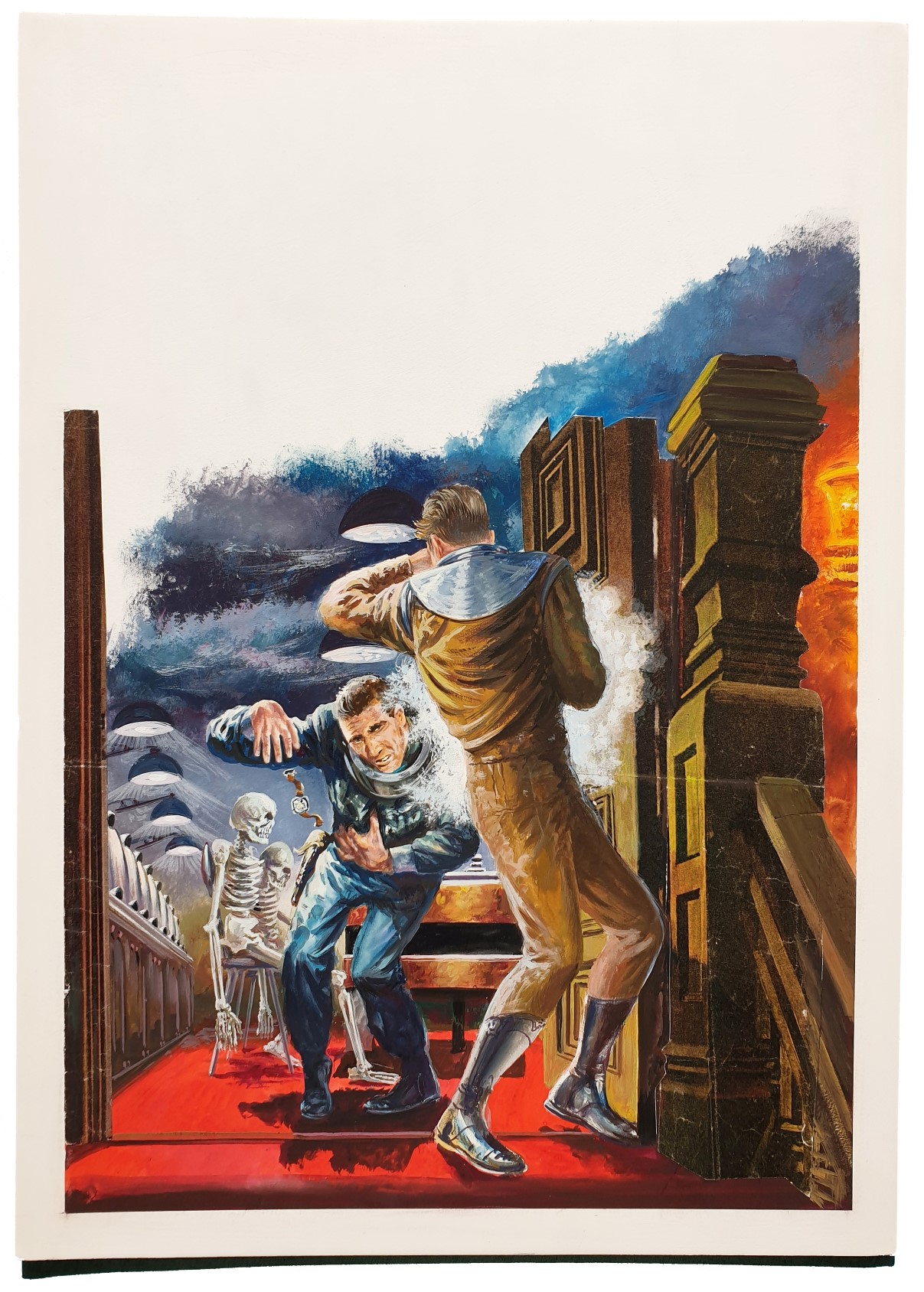
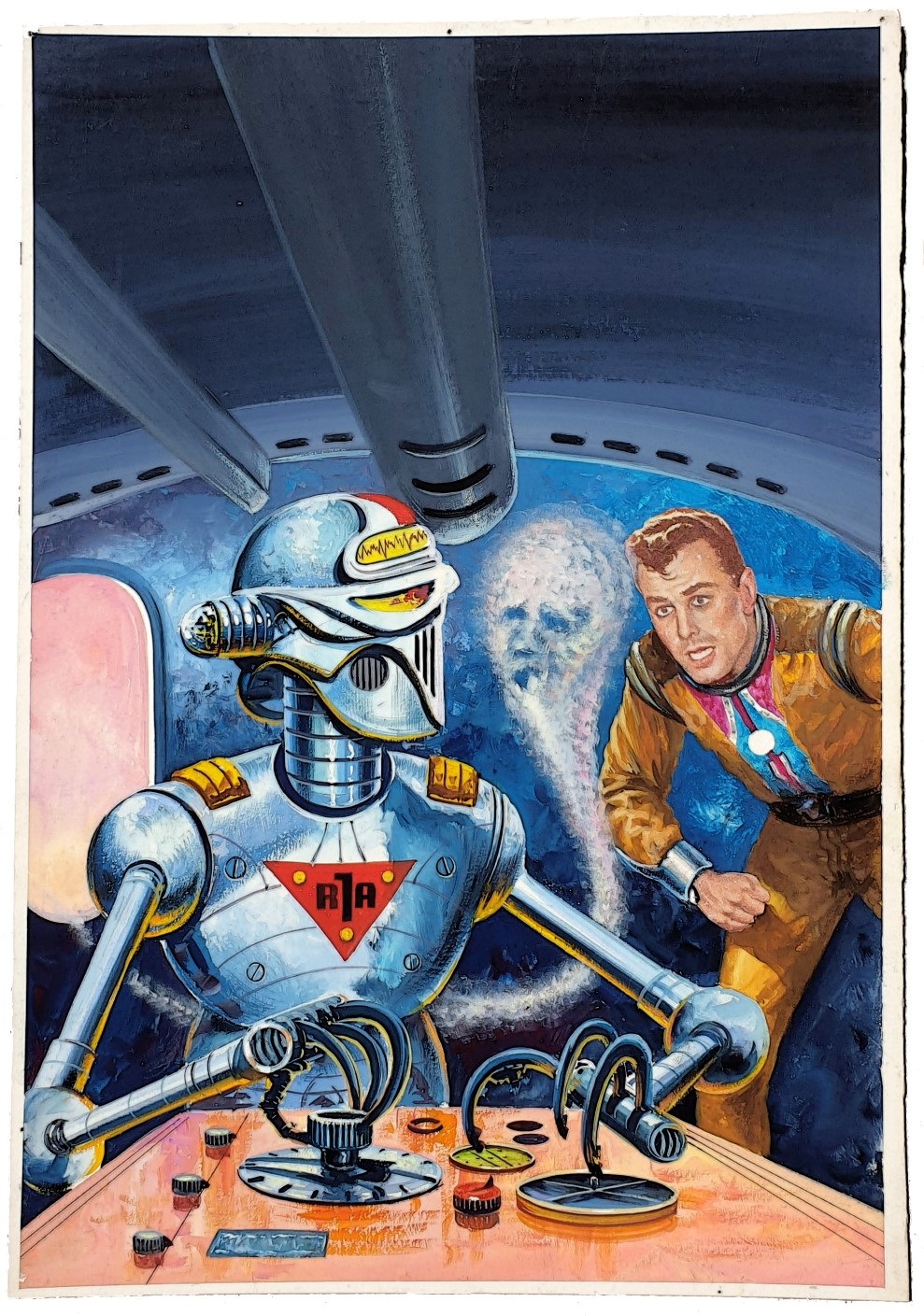
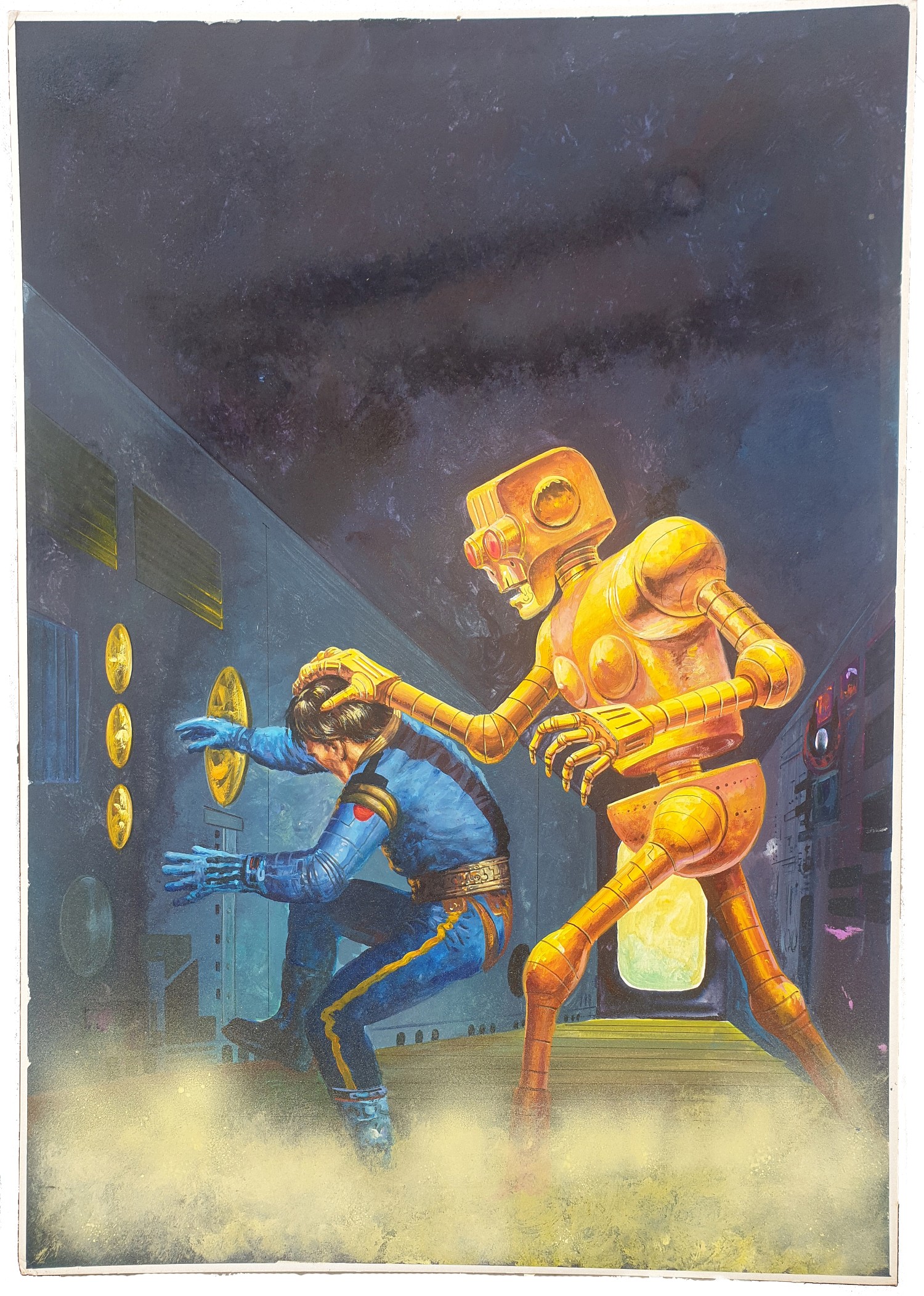
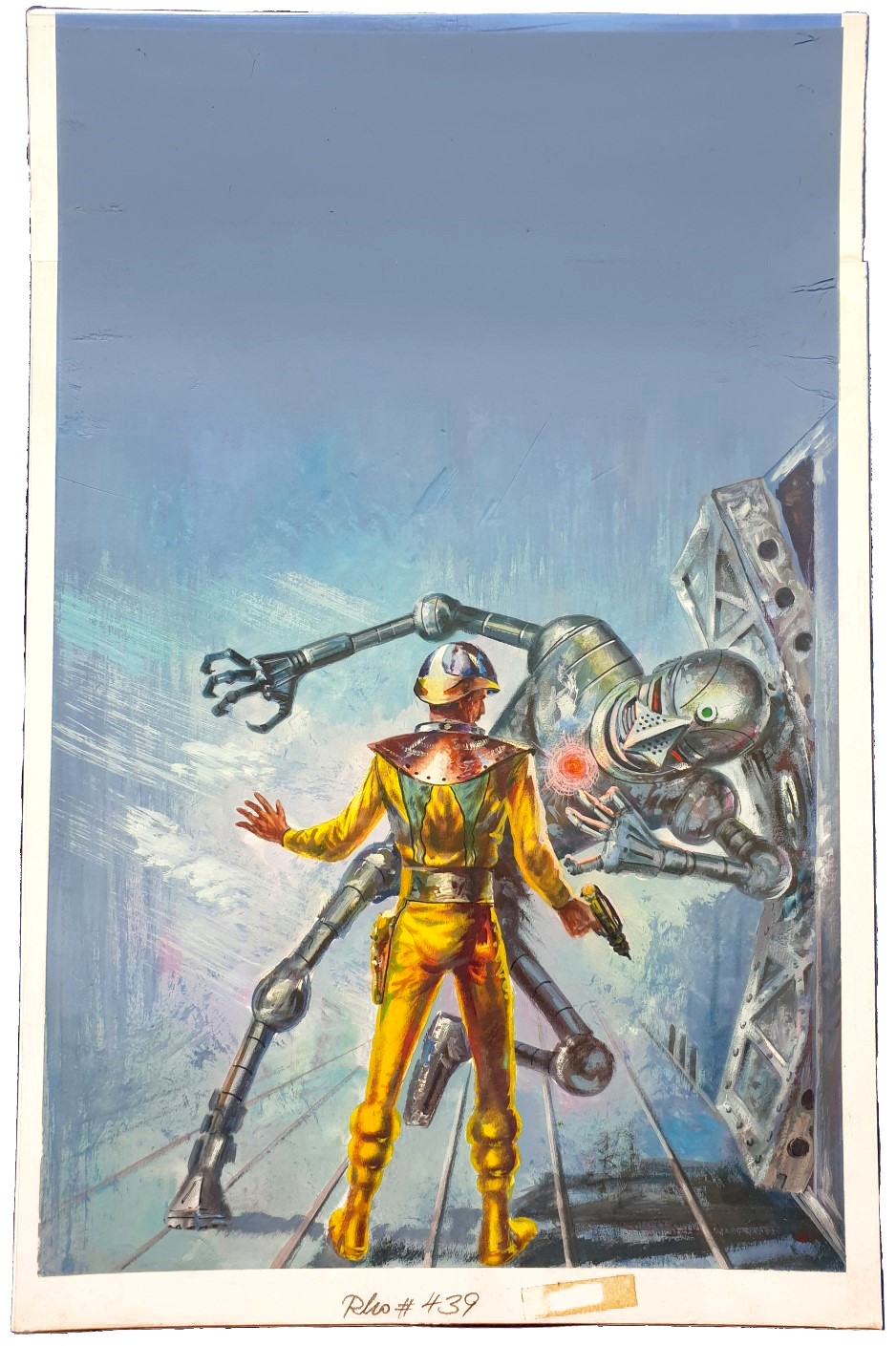
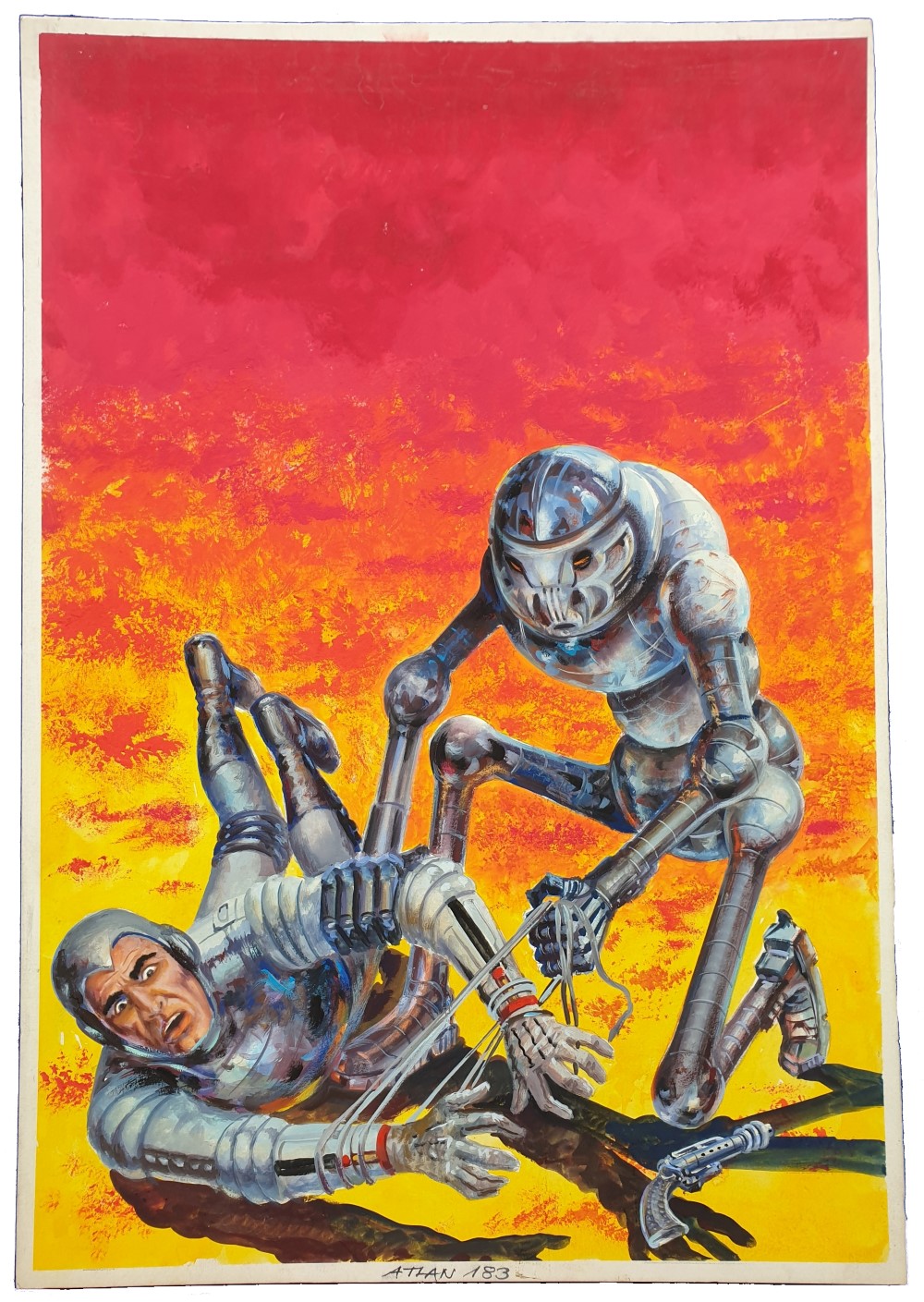
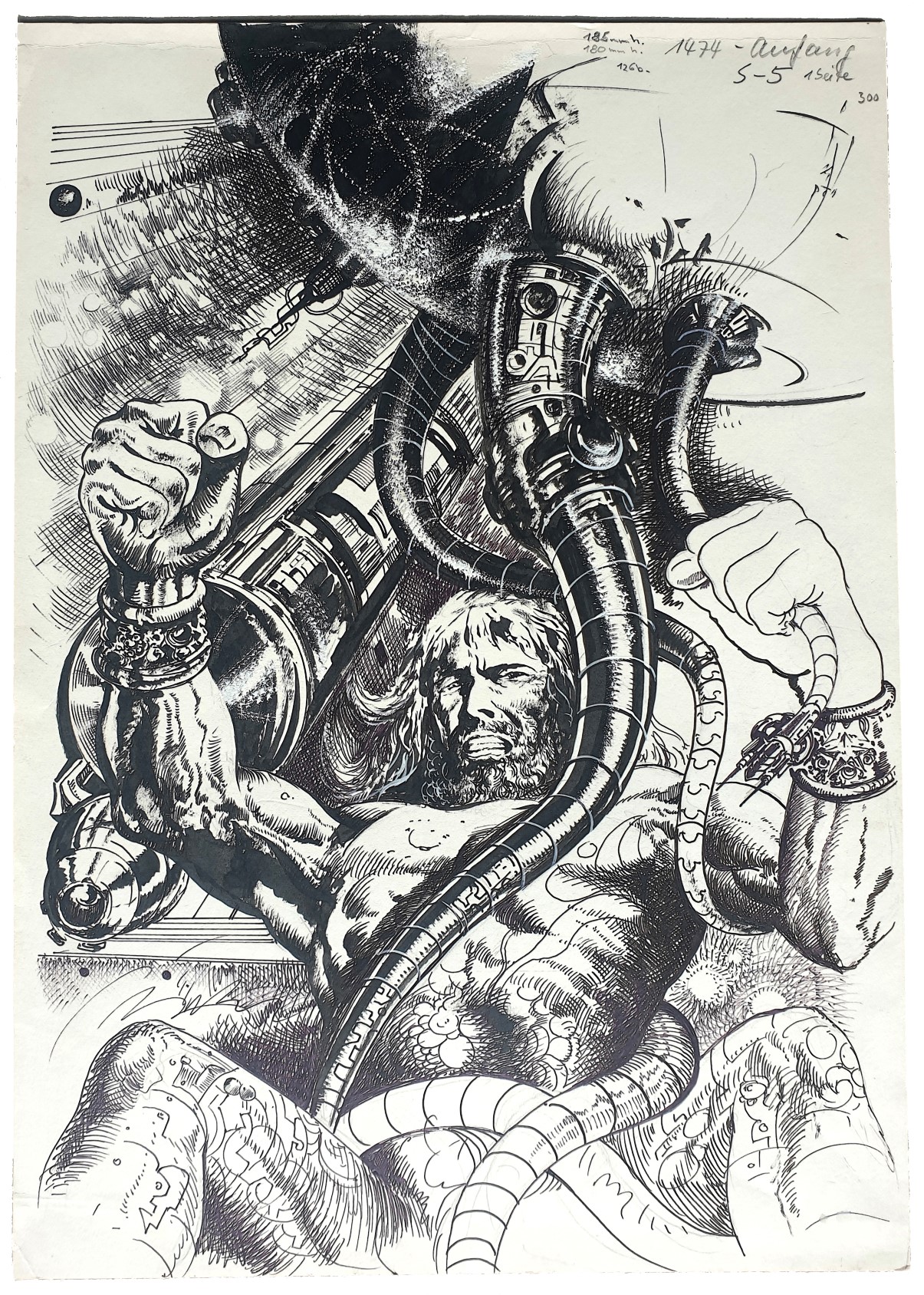
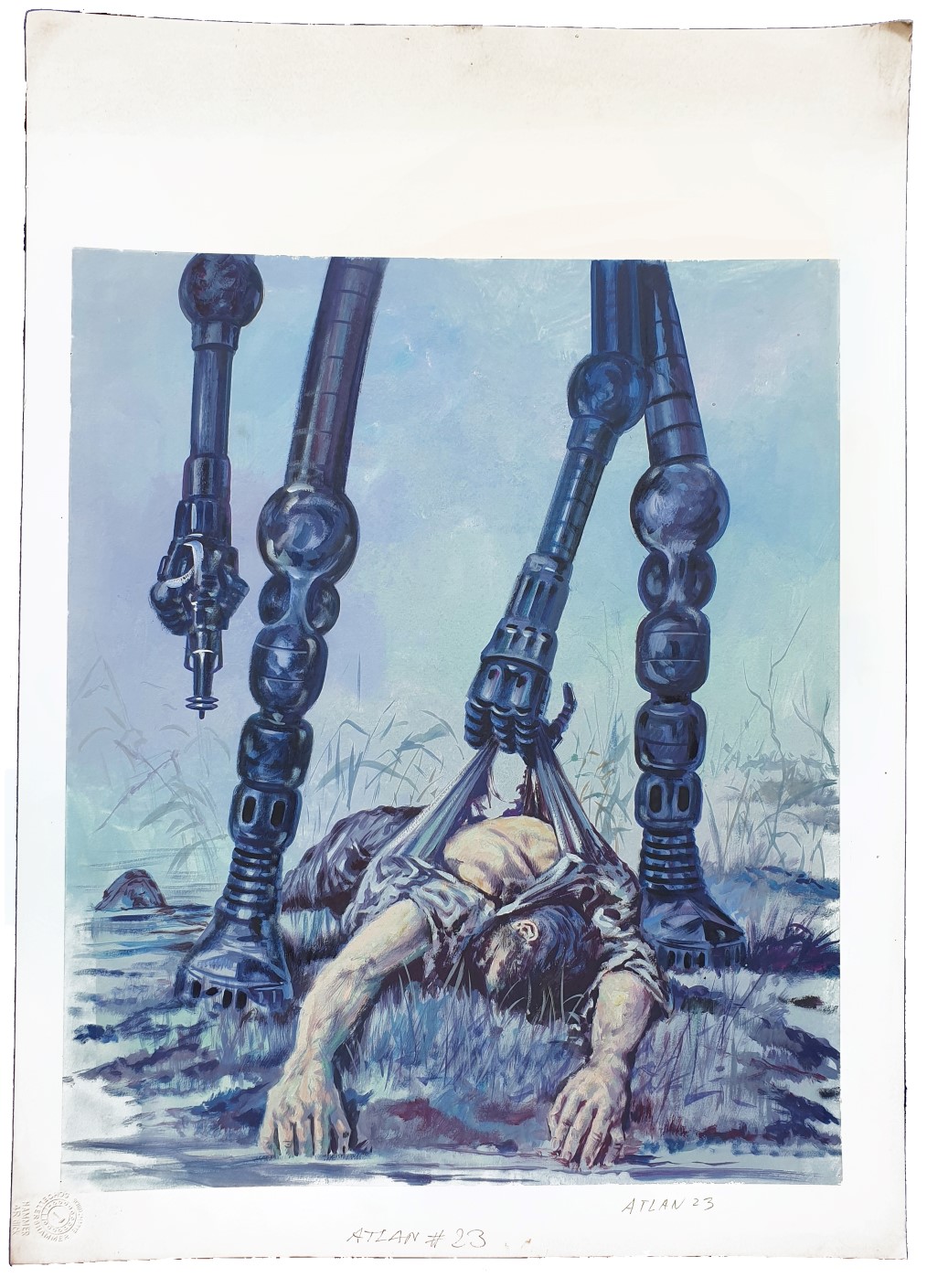
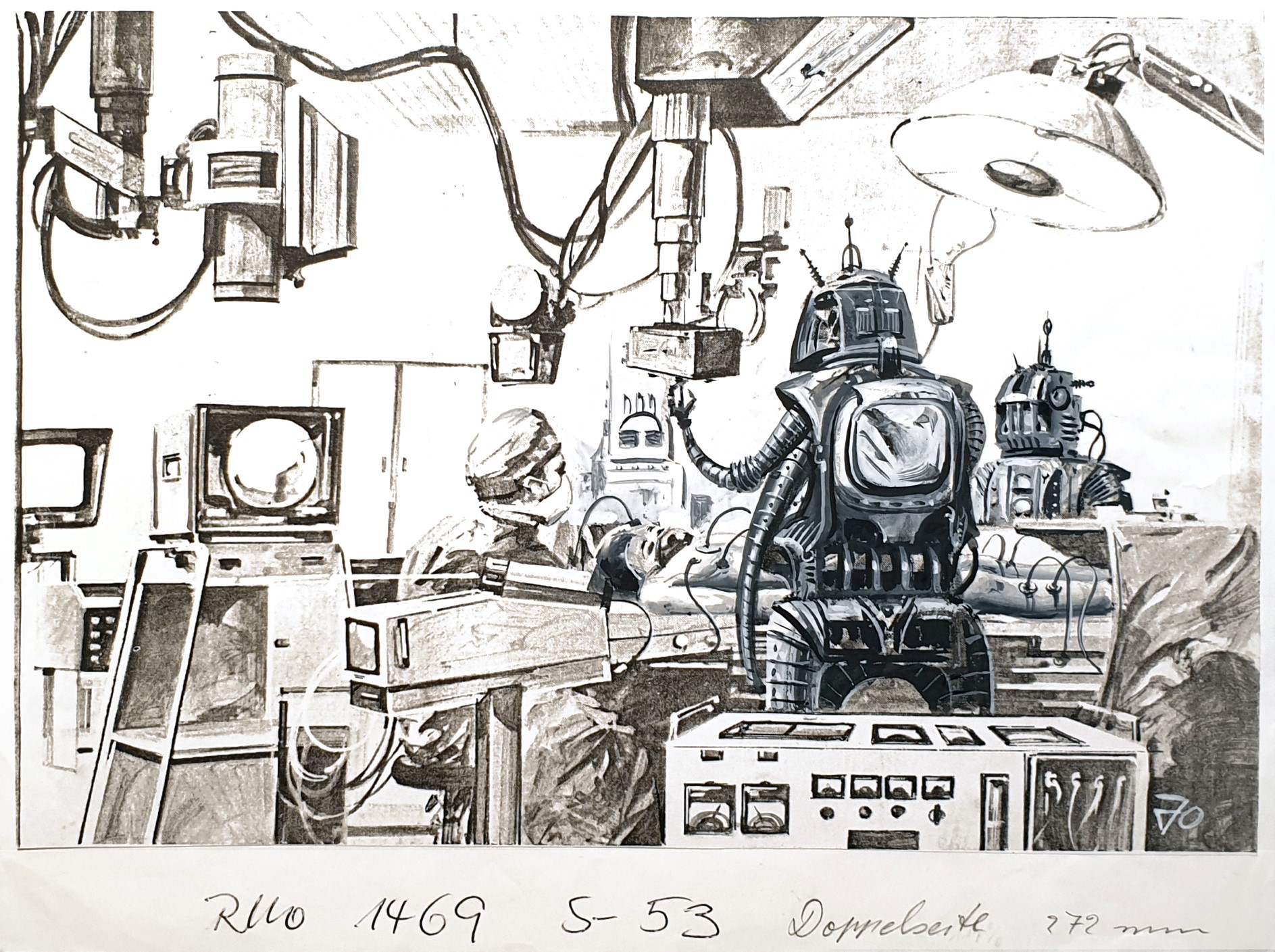
| On my walls, you’ll find paintings by Uwe Bremer (23), Topor, Wunderlich, Giger (2), the Gugging artists (6), a Warhol banana, several Dadaists (5), Max Ernst, and a few Tichas. One Thomas Ott. Plus, a bunch of ink comic drawings (9). Did I mention the felt postcard from Joseph Beuys? |
|
Peter–Robert Koenig in "Haus der Künstler" in Gugging — 10th May 1984 — Painting by August Walla. | 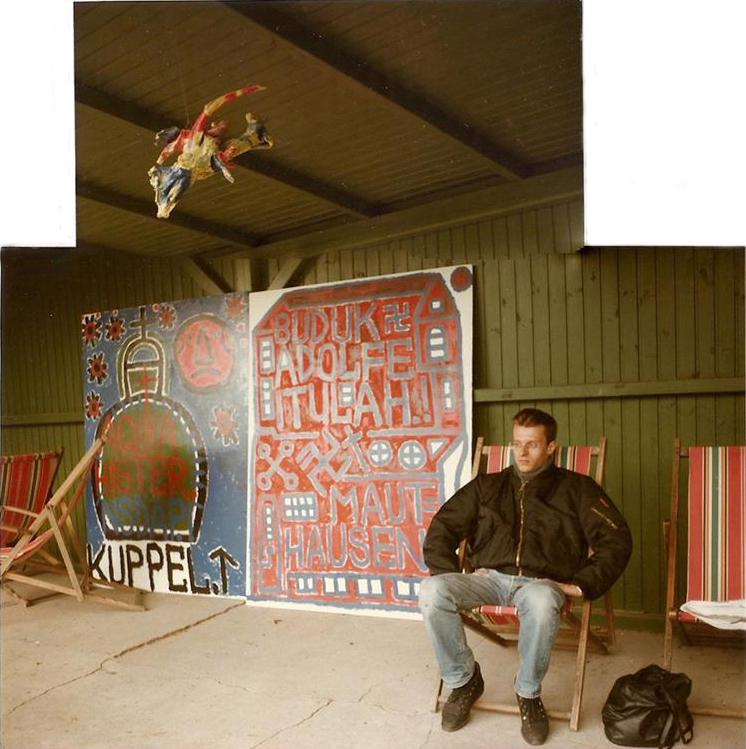
|
|
Since May 1984, I've visited Gugging several times (see the photo above from my first visit). Oswald Tschirtner wasn’t able to create spontaneous, original works, so he made drawings based on my instructions. He relied on the guidance of Leo Navratil, the former director of the Artists’ House, to do so.
Here’s how it went: The three of us were there — Tschirtner, Navratil, and me. Navratil asked, “Mr. König, what should Oswald draw for you?” I said, “A person reading.” Then Navratil turned to Tschirtner and said, “Oswald, please draw a person reading for Mr. König.” |
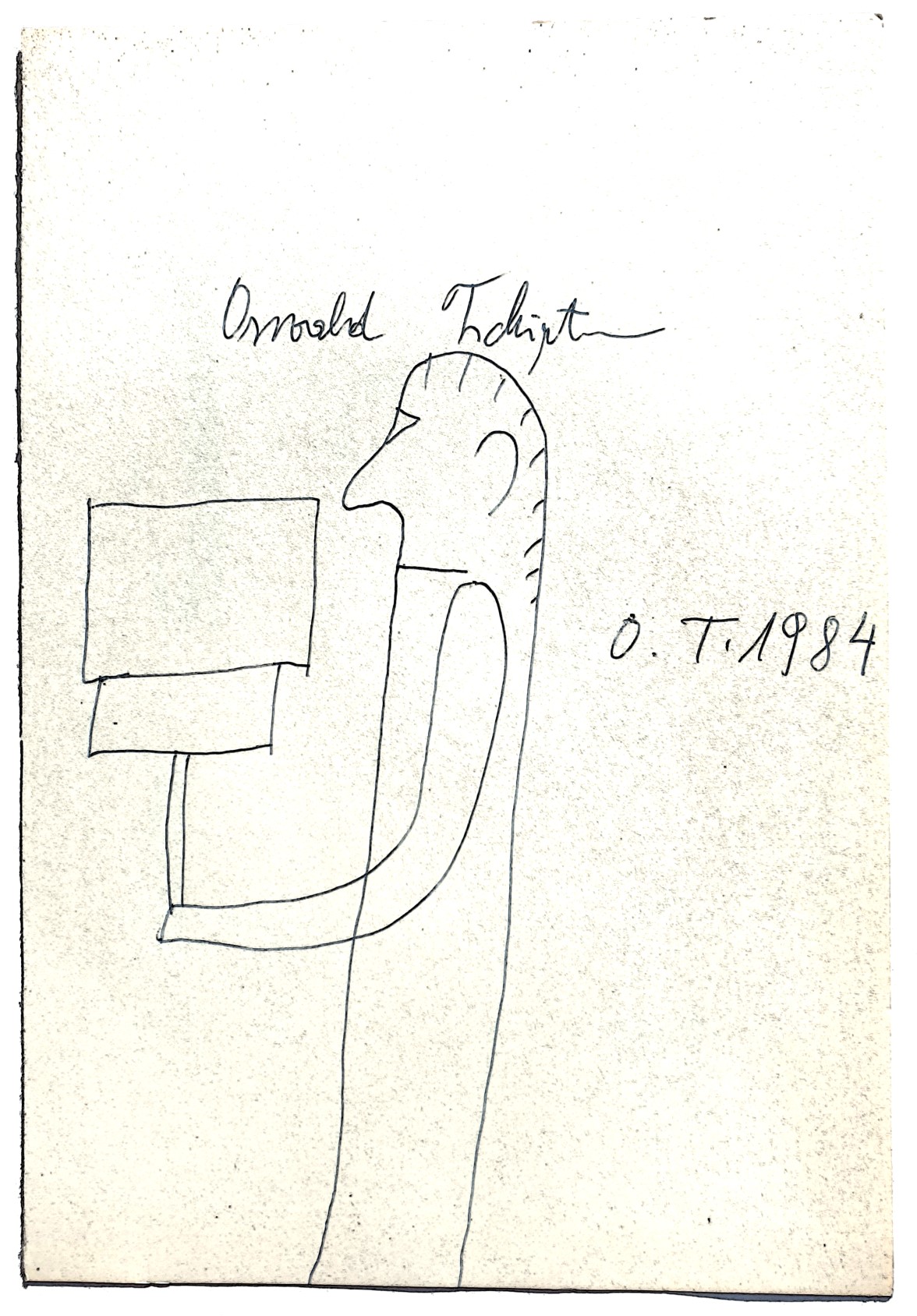
Oswald Tschirtner, “A Person Reading”
|
Michael Paul Bertiaux (Gnostic Churches and O.T.O.A.) |
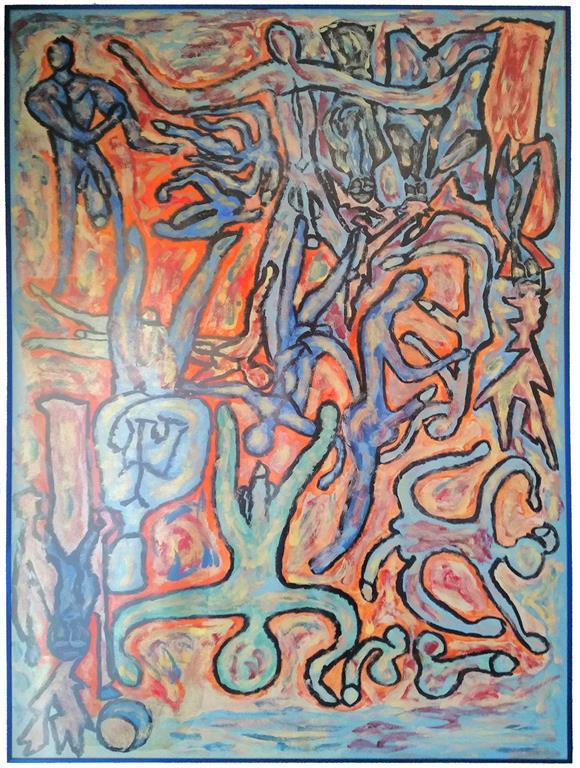
|
|||||||
|
|
W.W. Webb (XI°) and William Wallace Webb: Frater Damon, Hermetic Alchemical Order of the QBLH, Philosophic Gnostic Hermetic Society, Qabalistic Alchemist Church, Ordo Argenteum Astrum.
|
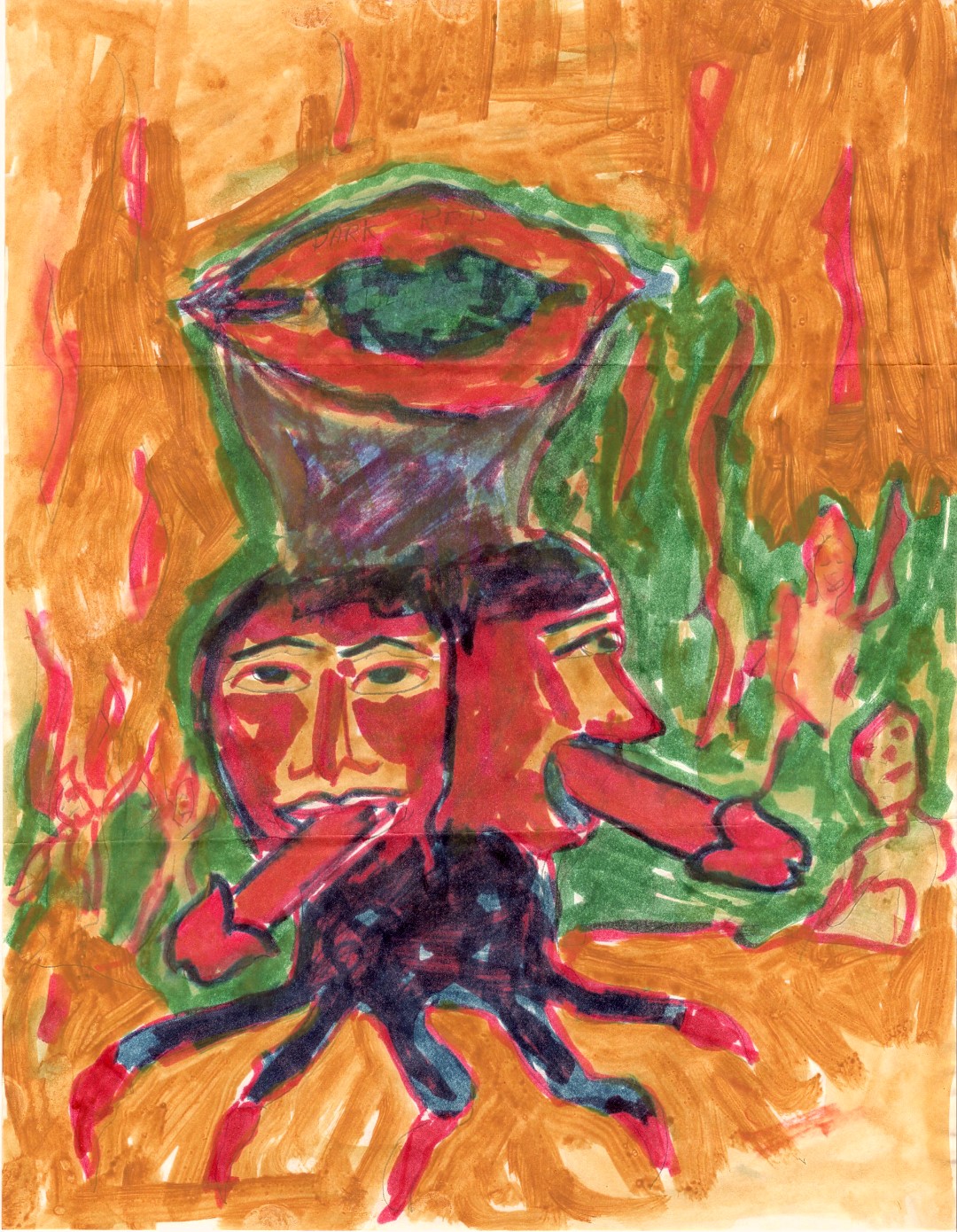
|
|
Johannes Maikowski (Fraternitas Saturni)
|




|
|
French artist and 'Caliphate' protagonist Philippe Pissier (Philippe Pissier — O.T.O. in Russia)
|
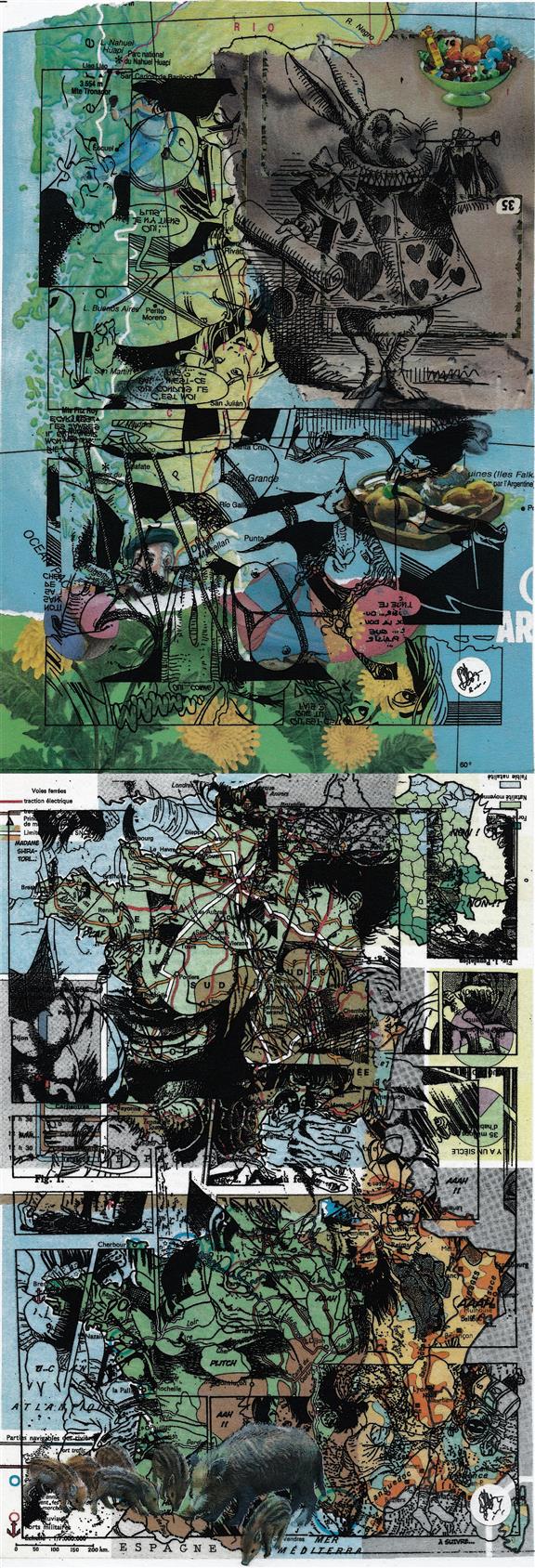
|
|
Here endeth the ecstasy.
© P.R. Koenig June 1998 / August 2000. Translated by Mark Parry-Maddocks. Expanded German original: Nein, von diesem Lichte ess ich nicht! Expanded print version in Der O.T.O. Phänomen RELOAD. |
|

